TED《出人意料的工作动机》中英文对照演讲稿)
TED演讲稿英文
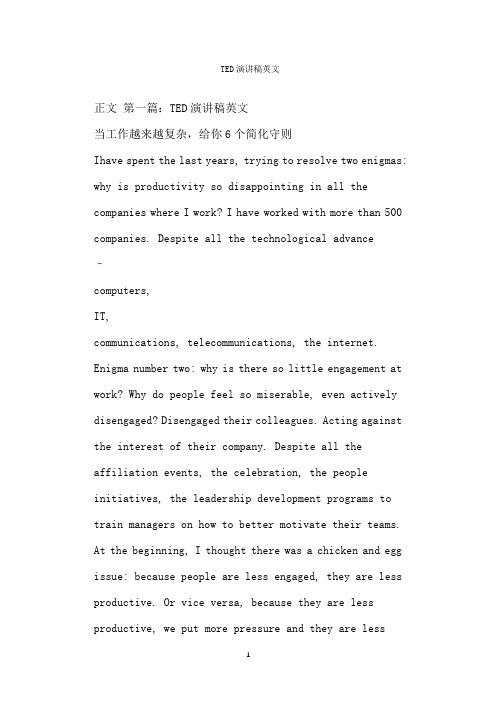
TED演讲稿英文正文第一篇:TED演讲稿英文当工作越来越复杂,给你6个简化守则Ihave spent the last years, trying to resolve two enigmas: why is productivity so disappointing in all the companies where I work? I have worked with more than 500 companies. Despite all the technological advance–computers,IT,communications, telecommunications, the internet. Enigma number two: why is there so little engagement at work? Why do people feel so miserable, even actively disengaged? Disengaged their colleagues. Acting against the interest of their company. Despite all the affiliation events, the celebration, the people initiatives, the leadership development programs to train managers on how to better motivate their teams. At the beginning, I thought there was a chicken and egg issue: because people are less engaged, they are less productive. Or vice versa, because they are less productive, we put more pressure and they are lessengaged. But as we were doing our analysis we realized that there was a common root cause to these two issues that relates, in fact, to the basic pillars of management. The way we organize is based on two pillars.The hard—structure, processes, systems. The soft—feeling, sentiments, interpersonal relationship, traits, personality. And whenever a company reorganizes, restructures, reengineers, goes through a cultural transformation program, it chooses these two pillars. Now we try to refine them, we try to combine them. The real issue is –and this is the answer to the two enigmas – these pillar are obsolete. Everything you read in business books is based either two of the other or their combine. They are obsolete. How do they work when you try to use these approaches in front of the new complexity of business? The hard approach, basically is that you start from strategy, requirement, structure, processes,systems,KPIs,scorecards,committees, headquarters, hubs, clusters, you name it.I forgot all the metrics, incentives, committees, middle offices and interfaces. What happens basically on the left, you have more complexity, the new complexity of business. We need quality, cost, reliability, speed. And every time there is a new requirement, we use the same approach. We create dedicated structure processed systems, basically to deal with the new complexity of business. The hard approach creates just complicatedness in the organization. Let’s take an example. An automotive company, the engineering division is a five-dimensional matrix. If you open any cell of the matrix, you find another 2021imensional matrix. You have Mr. Noise, Mr. Petrol Consumption, Mr. Anti-Collision Propertise. For any new requirement, you have a dedicated function in charge of aligning engineers against the new requirement. What happens when the new requirement emerges? Some years ago, a new requirement appeared on the marketplace: the length of the warranty period. So therefore the requirement is repairability, making cars easy to repair. Otherwise when you bring the car to the garage to fix the light, if you have to remove the engine to access the lights,the car will have to stay one week in the garage instead of two hours, and the warranty budget will explode. So, what was the solution using the hard approach? If repairability is the rew requirement, the solution is to create a new function, Mr. Repairability. And Mr. Repairability creates the repairability process. With a repairability scorecard, with a repairability metric and eventually repairability incentive.That came on top of 25 other KPIs. What percentage of these people is variable compensation? Twenty percent at most, divided by 26 KPIs, repairability makes a difference of 0.8 percent. What difference did it make in their action, their choices to simplify? Zero. But what occurs for zero impact? Mr. Repairability, process, scorecard, evaluation, coordination with the 25 other coordinators to have zero impact. Now, in front of the new complexity of business, the only solution is not drawing box es with reporting lines. It is basically the interplay. How the parts work together. The connection, the interaction, the synapse. It is not skeleton of boxes, it is the nervous system of adaptiveness and intelligence. You know, you could call it cooperation, basically. Wheneverpeople cooperate, they use less resources. In everything. You know, the repairability issue is a cooperation problem.When you design cars, please take into account the need of those who will repair the cars in the after sales garage. When we don’t cooperate we need more time, more equipment, more system, more teams. We need – when procureme nt, supply chain, manufacturing don’t cooperate we need more stock, more investories, more working capital. Who will pay for that? Shareholder? Customers? No, they will refuse. So who is left? The employees, who have tocompensate through their super individual efforts for the lack of cooperation. Stress, burnout, they are overwhelmed, accidents. No wonder they disengage. How do the hard and the soft try to foster cooperation?The hard: in banks, when there is problem between the back office and the front of fice, they don’t cooperate. What is the solution? They create a middle office. What happens one years later? Instead of one problem between the back and front, now have to problems. Between the back and the middle and between the middle and thefront. Plus I have to pay for the middle office. The hard approach is unable to foster cooperation. It can only add new boxes, new bones in the skeleton. The soft approach: to make people cooperate, we need to make then like each other. Improve interpersonal feelings, the more people laike each other, the more they will cooperate. It is totally worng. It even counterproductive.Look, at home I have two TVs. Why? Precisely not to have to cooperate with my wife. Not to have to impose tradeoffs to my wife. And why I try not to impose tradeoffs to my wife is precisely because I love my wife. If I didn’t love my wife, one TV would be enough: you will watch my favorite football game, if you are not happy, how is the book or the door? The more we like each other, the more we avoid the real cooperation that would strain our relationships by imposing tough tradeoffs. And we go for a second TV or we escalate the decision above for arbitration.Definitely, these approaches are obsolete. To deal with complexity, to enhance nervous system, we have created what we call the smart simplicity approach based onsimple rules. Simple rule number one: understand what others do. What is their real work? We need go beyond the boxes, the job description, beyond the surface of the container, to understand the real content. Me, designer, if I put a wire here, I know that it will mean that we will have to remove the engine to access the lights. Second, you need to reinforce integrators. Integrators are not middle office, they are managers, existing managers that you reinforce so that they have power and interest to make others cooperate. How can you reinforce your managers as integrators? By removing layers. When there are too many layers people are too far from the action. Therefore they need KPIs, metrics, they need poor proxies for reality. They don’t understand reality and they add the complicatedness of metrics, KPIs. By removing rules—the bigger we are, the more we need integrators, therefore the less rules we must have, to give discretionary power to managers. And we do the opposite – the bigger we are, the more rules we create. And we end up with the Encyclopedia Britannica of rules. You need to increase the quanitity of power so that you can empower everybody to use their judgment,their intelligence. You must give more cards to people so that they have the critical mass of cards to take the risk to cooperate, to move out of insulation. Otherwise, they will withdraw. They will disengage. These rules, they come from game theory and organizational sociology. You can increase the shadow of the future. Create feedback loops that expose people to the consequences of their actions. This is what the automotive company did when they saw that Mr. Repairability had no impact. They said the design engineers: now, in the three years, when the new car is launched on the market, you will move to the after sales network, and become in charge of the warranty budget, and if the warranty budget explodes, it will explode in your face. Much more powerful than 0.8 percent variable compensation. You need also to increase reciprocity, by removing the buffers that make us self-sufficient. When you remove these buffers, you hold me by the nose, I hold you by the ear. We will cooperate. Remove the second TV. There are many second TVs at work that don’t create value, they just provide dysfunctional self-sufficiency.You need to reward those who cooperate and blame thosewho don’t cooperate. The CEO of The Lego Group, JK, has a great way to use it. He say, blame is not for failure, it is for failing to help or ask for help. It changes everything. Suddenly it becomes in my interest to be transparent on my real weakness, my real forecast, because I know I will not be blamed if I fail, but ifI fail to help or ask for help. When you do this, it hasa lot of implications on organizational design. You stop drawing boxes, dotted lines, full lines; you look at their interplay.It has a lot of implication on financial policies that we use. On human resource management practices. When you do that, you can manage complexity, the new complexity of business, without getting complicated. You create more value with lower cost. You simultaneously improve performance and satisfaction at work because you have remove the common root cause that hinders both. Complicatedness: this is your battle, business leader. The real battle is not against competitors. This is rubbish, very abstract. When do we meet competitors to fight them? The real battle is against ourselves, against our bureaucracy, our complicatedness. Only youcan fight, can do it. Thank you!第二篇:ted英文演讲稿ted英文演讲稿:犯错的价值每个人都会避免犯错,但或许避免犯错本身就是一种错误?请看以下这篇“犯错家“凯瑟琳舒尔茨告诉我们,或许我们不只该承认错误,更应该大力拥抱人性中“我错故我在“的本质。
ted演讲稿大全
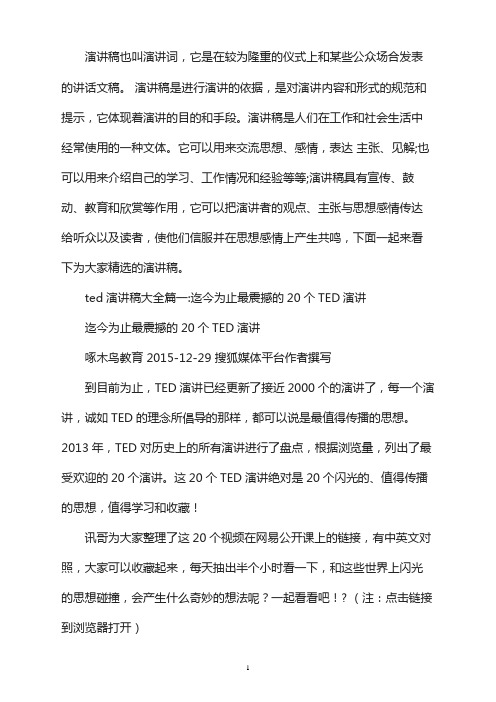
演讲稿也叫演讲词,它是在较为隆重的仪式上和某些公众场合发表的讲话文稿。
演讲稿是进行演讲的依据,是对演讲内容和形式的规范和提示,它体现着演讲的目的和手段。
演讲稿是人们在工作和社会生活中经常使用的一种文体。
它可以用来交流思想、感情,表达主张、见解;也可以用来介绍自己的学习、工作情况和经验等等;演讲稿具有宣传、鼓动、教育和欣赏等作用,它可以把演讲者的观点、主张与思想感情传达给听众以及读者,使他们信服并在思想感情上产生共鸣,下面一起来看下为大家精选的演讲稿。
ted演讲稿大全篇一:迄今为止最震撼的20个TED演讲迄今为止最震撼的20个TED演讲啄木鸟教育 2015-12-29 搜狐媒体平台作者撰写到目前为止,TED演讲已经更新了接近2000个的演讲了,每一个演讲,诚如TED的理念所倡导的那样,都可以说是最值得传播的思想。
2013年,TED对历史上的所有演讲进行了盘点,根据浏览量,列出了最受欢迎的20个演讲。
这20个TED演讲绝对是20个闪光的、值得传播的思想,值得学习和收藏!讯哥为大家整理了这20个视频在网易公开课上的链接,有中英文对照,大家可以收藏起来,每天抽出半个小时看一下,和这些世界上闪光的思想碰撞,会产生什么奇妙的想法呢?一起看看吧!? (注:点击链接到浏览器打开)以下是迄今为止全世界TED粉丝们最喜爱的20个TED演讲。
1最受欢迎TED演讲No.1:学校如何扼杀创造力全球著名创造力研究专家Sir Ken Robinson 就创建一个呵护而非摧残创造力的教育体系展开讲述,幽默风趣,发人深思。
“教育扼杀了人们的创造力”,Robinson的这句话引起了许多人的深刻共鸣,Robinson在2006年TED 讲坛中的这次讲演在互联网上被广泛转载,流传甚远,至今仍是TED讲坛最受欢迎的讲演之一。
这是TED有史以来被观看最多的一个视频(1100多万次)。
Robinson是一个极其出色的演讲大师,整个视频让人从头笑到尾(英国人就是幽默啊),但在让人发笑的同时也发人深省。
TED英语演讲:我为什么要制造无用的东西

TED英语演讲:我为什么要制造无用的东西在这个愉快的,发自内心的演讲中,西蒙妮吉尔茨分享了她的手艺:制造无用的机器人。
她的发明-设计用来切蔬菜、剪头发、涂口红等等-很少(如果有的话)成功,这就是重点。
吉尔茨说:制造无用事物的真正美妙之处在于承认你并不总是知道最好的答案是什么。
它关闭了你头脑中的声音,告诉你确切地知道这个世界是如何运作的。
也许牙刷头盔不是答案,但至少你在问这个问题。
演讲者:Ivan Joseph| 中英对照演讲稿 |Hello. My name is Simone. You know how people tell you if you get nervous when onstage, picture people in the audien cenaked? Like it’s this thing that’s supposed to make you feel better. But I was thinking -- picturing all of you naked in 20xx feels kind of weird and wrong.大家好。
我是Simone。
人们总是告诉你当你在舞台上感到紧张的时候,假想观众都没穿衣服就好了。
说的就像这真能让你感觉好点一样。
但是我一直在想在20xx年想象你们都没穿衣服实在有点不太对啊。
Like, we’re working really hard on moving past stuff like that, so we need anew method of dealing with if you get nervous onstage. And I realized that whatI’d really like is that I can look at you as much as you’re looking at me --just to even things out a little bit. So if I had way more eyeballs, then we’dall be really fortable, right? So in preparation for this talk, I made myself a shirt.(Rattling) 我们都有在努力克服这样的问题,所以我们需要一种新方法,来应付舞台恐惧症。
TED演讲-如何找到你喜欢的工作-双语
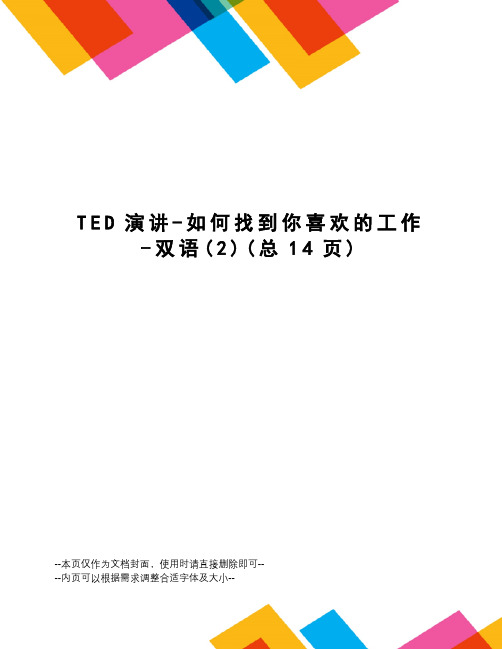
T E D演讲-如何找到你喜欢的工作-双语(2)(总14页)--本页仅作为文档封面,使用时请直接删除即可----内页可以根据需求调整合适字体及大小--TED演讲:如何找到你喜欢的工作?双语(2)这是一篇由网络搜集整理的关于TED演讲:如何找到你喜欢的工作(双语)的文档,希望对你能有帮助。
TED演讲:如何找到你喜欢的工作(双语)14:24To sum things up, in terms of these three pillars, they all have one thingin common more than anything else. They are 100 percent in our control. No one can tell you you can't learn about yourself. No one can tell you you can't push your limits and learn your own impossible and push that. No one can tell you you can't surround yourself with inspiring people or get away from the people who bring you down. You can't control a recession. You can't control getting fired or getting in a car accident. Most things are totally out of our hands. These three things are totally on us, and they can change our whole world if we decide to do something about it.15:03And the thing is, it's starting to happen on a widespread level. I just read in Forbes, the US Government reported for the first time in a month where more people had quit their jobs than had been laid off. They thought this was an anomaly, but it's happened three months straight. In a time where people claim it's kind of a tough environment, people are giving a middle finger to thisscripted life, the things that people say you're supposed to do, in exchange for things that matter to them and do the things that inspire them.15:27And the thing is, people are waking up to this possibility, that really the only thing that limits possibility now is imaginati on. That's not a cliché anymore.I don't care what it is that you're into, what passion, what hobby. If you're into knitting, you can find someone who is killing it knitting, and you can learn from them. It's wild. And that's what this whole day is about, to learn from the folks speaking, and we profile these people on Live Your Legend every day, because when ordinary people are doing the extraordinary, and we can be around that, it becomes normal. And this isn't about being Gandhi or Steve Jobs, doing something crazy. It's just about doing something that matters to you, and makes an impact that only you can make.16:10Speaking of Gandhi, he was a recovering lawyer, as I've heard the term, and he was called to a greater cause, something that mattered to him, he couldn't not do. And he has this quote that I absolutely live by. "First they ignore you, then they laugh at you, then they fight you, then you win."16:28Everything was impossible until somebody did it. You can either hang around the people who tell you it can't be done and tell you you're stupid for trying, or surround yourself with the people who inspire possibility, the peoplewho are in this room. Because I see it as our responsibility to show the world that what's seen as impossible can become that new normal. And that's already starting to happen. First, do the things that inspire us, so we can inspire other people to do the things that inspire them. But we can't find that unless we know what we're looking for. We have to do our work on ourself, be intentional about that, and make those discoveries. Because I imagine a world where 80 percent of people love the work they do. What would that look like What would the innovation be like How would you treat the people around you Things would start to change.17:19And as we finish up, I have just one question to ask you guys, and I think it's the only question that matters. And it's what is the work you can't not do Discover that, live it, not just for you, but for everybody around you, because that is what starts to change the world. What is the work you can't not do 中文:哇!真荣幸。
TED演讲双语演讲稿:如何找到自己喜欢的工作?(精编word打印版)
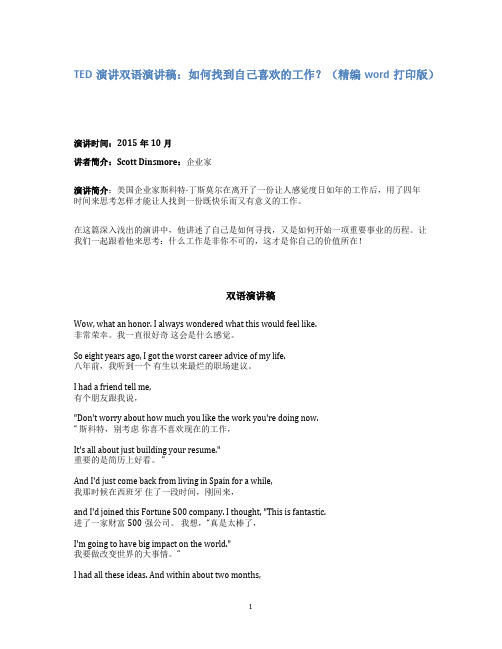
TED演讲双语演讲稿:如何找到自己喜欢的工作?(精编word打印版)演讲时间:2015年10月讲者简介:Scott Dinsmore:企业家演讲简介:美国企业家斯科特·丁斯莫尔在离开了一份让人感觉度日如年的工作后,用了四年时间来思考怎样才能让人找到一份既快乐而又有意义的工作。
在这篇深入浅出的演讲中,他讲述了自己是如何寻找,又是如何开始一项重要事业的历程。
让我们一起跟着他来思考:什么工作是非你不可的,这才是你自己的价值所在!双语演讲稿Wow, what an honor. I always wondered what this would feel like.非常荣幸。
我一直很好奇这会是什么感觉。
So eight years ago, I got the worst career advice of my life.八年前,我听到一个有生以来最烂的职场建议。
I had a friend tell me,有个朋友跟我说,"Don't worry about how much you like the work you're doing now.“ 斯科特,别考虑你喜不喜欢现在的工作,It's all about just building your resume."重要的是简历上好看。
”And I'd just come back from living in Spain for a while,我那时候在西班牙住了一段时间,刚回来,and I'd joined this Fortune 500 company. I thought, "This is fantastic.进了一家财富500强公司。
我想,“真是太棒了,I'm going to have big impact on the world."我要做改变世界的大事情。
TED演讲改善工作的快乐之道!
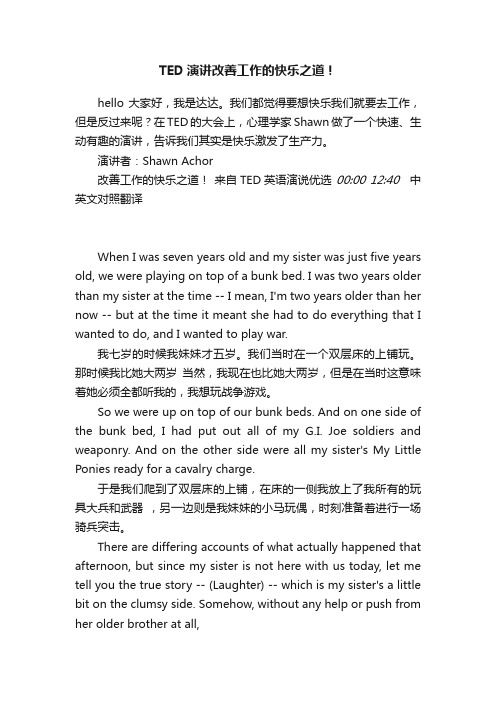
TED演讲改善工作的快乐之道!hello大家好,我是达达。
我们都觉得要想快乐我们就要去工作,但是反过来呢?在TED的大会上,心理学家Shawn做了一个快速、生动有趣的演讲,告诉我们其实是快乐激发了生产力。
演讲者:Shawn Achor改善工作的快乐之道!来自TED英语演说优选00:0012:40中英文对照翻译When I was seven years old and my sister was just five years old, we were playing on top of a bunk bed. I was two years older than my sister at the time -- I mean, I'm two years older than her now -- but at the time it meant she had to do everything that I wanted to do, and I wanted to play war.我七岁的时候我妹妹才五岁。
我们当时在一个双层床的上铺玩。
那时候我比她大两岁当然,我现在也比她大两岁,但是在当时这意味着她必须全都听我的,我想玩战争游戏。
So we were up on top of our bunk beds. And on one side of the bunk bed, I had put out all of my G.I. Joe soldiers and weaponry. And on the other side were all my sister's My Little Ponies ready for a cavalry charge.于是我们爬到了双层床的上铺,在床的一侧我放上了我所有的玩具大兵和武器,另一边则是我妹妹的小马玩偶,时刻准备着进行一场骑兵突击。
ted中英文对照

ted中英文对照TED (Technology, Entertainment, Design) 是一个国际性的演讲和会议平台,旨在分享和传播创新思想、理念和科技。
以下是一些 TED 演讲的中英文对照:1. "The Power of Introverts"(内向的力量)中文:内向的力量2. "The Happy Secret to Better Work"(快乐工作更高效)中文:快乐工作更高效3. "How to Speak Up and Be Heard"(如何表达并被听到)中文:如何表达并被听到4. "The Danger of a Single Story"(单一故事的危险性)中文:单一故事的危险性5. "The Surprising Science of Happiness"(幸福的惊人科学)中文:幸福的惊人科学6. "The Real Reason to Quit Your Day Job"(真正辞职的原因)中文:真正辞职的原因7. "The Beauty of Failure"(失败之美)中文:失败之美8. "The Happy Secret of the Winners"(成功者的快乐秘诀)中文:成功者的快乐秘诀9. "The Power of Vulnerability"(脆弱的力量)中文:脆弱的力量10. "How to Win at the Game of Life"(如何在生活中获胜)中文:如何在生活中获胜以上只是部分TED 演讲的中英文对照,如果您需要其他演讲的中英文对照,可以告诉我。
TED英文演讲稿:Whyyouwillfailtohaveagreatcareer
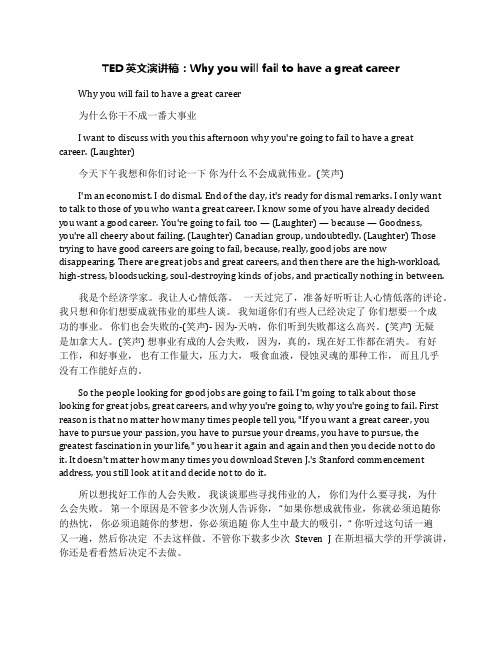
TED英文演讲稿:Why you will fail to have a great career Why you will fail to have a great career为什么你干不成一番大事业I want to discuss with you this afternoon why you're going to fail to have a great career. (Laughter)今天下午我想和你们讨论一下你为什么不会成就伟业。
(笑声)I'm an economist. I do dismal. End of the day, it's ready for dismal remarks. I only want to talk to those of you who want a great career. I know some of you have already decided you want a good career. You're going to fail, too — (Laughter) — because — Goodness,you're all cheery about failing. (Laughter) Canadian group, undoubtedly. (Laughter) Those trying to have good careers are going to fail, because, really, good jobs are now disappearing. There are great jobs and great careers, and then there are the high-workload, high-stress, bloodsucking, soul-destroying kinds of jobs, and practically nothing in between.我是个经济学家。
(完整版)TED《出人意料的工作动机》中英文对照演讲稿)
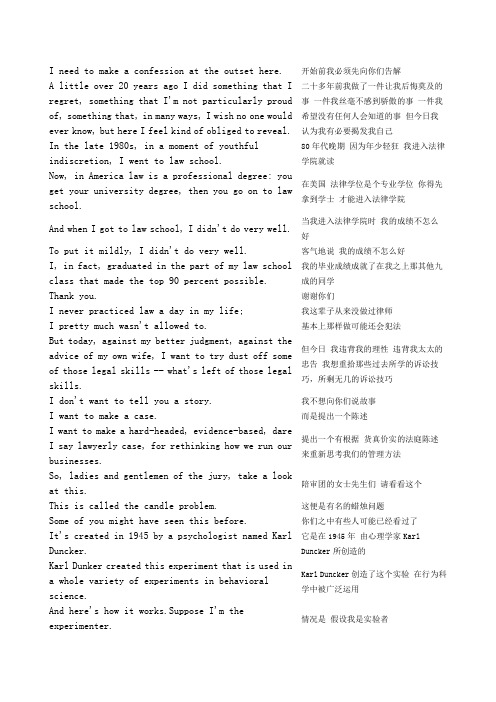
I need to make a confession at the outset here. 开始前我必须先向你们告解A little over 20 years ago I did something that I regret, something that I'm not particularly proud of, something that, in many ways, I wish no one would ever know, but here I feel kind of obliged to reveal. 二十多年前我做了一件让我后悔莫及的事一件我丝毫不感到骄傲的事一件我希望没有任何人会知道的事但今日我认为我有必要揭发我自己In the late 1980s, in a moment of youthful indiscretion, I went to law school. 80年代晚期因为年少轻狂我进入法律学院就读Now, in America law is a professional degree: you get your university degree, then you go on to law school. 在美国法律学位是个专业学位你得先拿到学士才能进入法律学院And when I got to law school, I didn't do very well. 当我进入法律学院时我的成绩不怎么好To put it mildly, I didn't do very well. 客气地说我的成绩不怎么好I, in fact, graduated in the part of my law school class that made the top 90 percent possible. 我的毕业成绩成就了在我之上那其他九成的同学Thank you. 谢谢你们I never practiced law a day in my life; 我这辈子从来没做过律师I pretty much wasn't allowed to. 基本上那样做可能还会犯法But today, against my better judgment, against the advice of my own wife, I want to try dust off some of those legal skills -- what's left of those legal skills. 但今日我违背我的理性违背我太太的忠告我想重拾那些过去所学的诉讼技巧,所剩无几的诉讼技巧I don't want to tell you a story. 我不想向你们说故事I want to make a case. 而是提出一个陈述I want to make a hard-headed, evidence-based, dare I say lawyerly case, for rethinking how we run our businesses. 提出一个有根据货真价实的法庭陈述来重新思考我们的管理方法So, ladies and gentlemen of the jury, take a lookat this.陪审团的女士先生们请看看这个This is called the candle problem. 这便是有名的蜡烛问题Some of you might have seen this before. 你们之中有些人可能已经看过了It's created in 1945 by a psychologist named Karl Duncker. 它是在1945年由心理学家Karl Duncker所创造的Karl Dunker created this experiment that is used in a whole variety of experiments in behavioral science. Karl Duncker创造了这个实验在行为科学中被广泛运用And here's how it works.Suppose I'm theexperimenter.情况是假设我是实验者I bring you into a room. I give you a candle, Some thumbtacks and some matches. 我带你进入一个房间给你一根蜡烛一些图钉和火柴And I say to you, “your job is to attach the candle to the wall so the wax doesn't drip onto the table.”Now what would you do? 告诉你说现在尝试把蜡烛固定在墙上让烛泪不要滴到桌上你会怎么做Now many people begin trying to thumbtack the candleto the wall.许多人尝试用图钉把蜡烛钉在墙上Doesn't work. 行不通Somebody, some people -- and I saw somebody kind of make the motion over here -- some people have a great idea where they light the match, melt the side of the candle, try to adhere it to the wall. 有些人台下也有些人做出这样的动作有些人想到他们可以点燃火柴溶化蜡烛的底部尝试把它黏在墙上It's an awesome idea. Doesn't work. 好主意但行不通And eventually, after five or 10 minutes,most people figure out the solution, which you can see here. 差不多过了五到十分钟大部分的人便会想出解决办法就像图片上那样The key is to overcome what's called functionalfixedness.重点是克服功能固着You look at that box and you see it only as a receptacle for the tacks. 当你看到盒子你不过把它当成装大头针的容器But it can also have this other function, as a platform for the candle. The candle problem. 但它还有其它功能那就是作为蜡烛的平台Now I want to tell you about an experiment using the candle problem, done by a scientist named Sam Glucksberg, who is now at Princeton University in the U.S. 现在我想告诉你另一个实验利用蜡烛问题由一个现在在普林斯顿大学叫做Sam Glucksberg 的科学家所做的实验This shows the power of incentives. 这实验让我们看见动机的力量Here's what he did. He gathered his participants. 他是这么做的他将参与者聚集在一个房间里And he said,“I'm going to time you. How quickly you can solve this problem ?”告诉他们我要开始计时看看你们能多快解决这个问题To one group he said, “I'm going to time you to establish norms, averages for how long it typically takes someone to solve this sort of problem.”他对其中一群人说我只是想取个平均值看一般人需要花多久的时间才能解决这样的问题To the second group he offered rewards. 他提供奖励给另一群人He said,“If you're in the top 25 percent of the fastest times, you get five dollars. If you're the fastest of everyone we're testing here today, you get 20 dollars.”他说如果你是前25%最快解决问题的人就能拿到五块钱如果你是今日所有人里解答最快的你就有20块钱Now this is several years ago. Adjusted for inflation, it's a decent sum of money for a few minutes of work. It's a nice motivator. 这个实验是几年前的事了按照通货膨胀几分钟就能拿到20块是很不错的是个不错的诱因Question: How much faster did this group solve the problem? 问题是这群人比另一群人的解题速度快了多少呢?Answer: It took them, on average, three and a half minutes longer. 答案是平均来说他们比另一组人多花了三分半钟Three and a half minutes longer. Now this makes nosense right?整整三分半钟这不合理不是吗I mean, I'm an American. I believe in free markets. 我是个美国人我相信自由市场That's not how it's supposed to work. Right? 这个实验不太对劲吧对吗If you want people to perform better, you reward them. Right? 如果你想要人们做得更好你便给他们奖赏对吗Bonuses, commissions, their own reality show. 红利佣金他们自己的真人秀Incentivize them. That's how business works. 赋予他们动机这就是商业法则But that's not happening here. 但实验里却不是这样You've got an incentive designed to sharpen thinking and accelerate creativity, and it does just the opposite. 奖励是为了增强思考能力及创意但事实却是相反It dulls thinking and blocks creativity. 它阻断了思考和创意能力And what's interesting about this experiment is thatit's not an aberration.有趣的事情是这个实验不是误差This has been replicated over and over and overagain, for nearly 40 years.它被一再重复在过去的四十年间These contingent motivators -- if you do this, then you get that -- work in some circumstances. 这些不同的诱因如果你这样做你就得到那个在某些情况里是可行的But for a lot of tasks, they actually either don't work or, often, they do harm. 但在许多任务中他们不是没有作用更有可能产生反效果This is one of the most robust findings in social science, and also one of the most ignored. 这是在社会科学中一项最有力的发现同时也是最为人忽略的I spent the last couple of years looking at thescience of human motivation, particularly the dynamics of extrinsic motivators and intrinsic motivators. 过去两年我研究人类的动机尤其是那些外部的激励因素和内在的激励因素And I'm telling you, it's not even close. 我可以告诉你两者相差悬殊If you look at the science, there is a mismatch between what science knows and what business does. 如果你使用科学方法查证你会发现科学知识和商业行为之间有条鸿沟And what's alarming here is that our business 我们必须注意的是我们的商业机制想operating system -- think of the set of assumptions and protocols beneath our businesses, how we motivate people, how we apply our human resources -- it's built entirely around these extrinsic motivators, around carrots and sticks. 想这些商业的协议和假设我们如何激励人心如何运用人资全是以这些外部激励因素作为基础打手心给块糖That's actually fine for many kinds of 20th centurytasks.对许多20世纪的工作来说是可行的But for 21st century tasks, that mechanistic, reward-and-punishment approach doesn't work, often doesn't work, and often does harm. 但面对21世纪的工作这些机械化的奖惩分明的作法已经不管用了有时更招致反效果Let me show you what I mean. 让我呈现我想表达的So Glucksberg did another experiment similar to this where he presented the problem in a slightly different way, like this up here. Okey? Glucksberg做了一个类似的实验这次他给了他们一个比较不同的问题像这个图里面的Attach the candle to the wall so the wax doesn't drip onto the table. 实验对象必须要找出一个让蜡烛黏在墙上又不会流下烛泪的方法Same deal.You: we're timing for norms. 相同地这边:我们要的是平均时间You: we're incentivizing. 这边:一样的给他们不同的诱因What happened this time? 结果呢This time, the incentivized group kicked the other group's butt. 这次有诱因的那组人远远地胜过了另一组人Why? Because when the tacks are out of the box, it's pretty easy isn't it? 为什么一旦我们把图钉从盒子里拿出来问题就变得相当简单不是吗If-then rewards work really well for those sorts of tasks, where there is a simple set of rules and a clear destination to go to. 假设在这个情况下奖励就变得非常有郊在规则简单目标明显的情况下Rewards, by their very nature, narrow our focus, concentrate the mind; that's why they work in so many cases. 奖励产生了作用让我们集中精神变得专注这便是为何奖励在许多情况下有效的缘故And so, for tasks like this, a narrow focus, where you just see the goal right there, zoom straight ahead to it, they work really well. 当我们面对的工作是范围狭窄你能清楚见到目标向前直冲时奖励便非常有效But for the real candle problem, you don't want to be looking like this. 但在真正的蜡烛问题中你不能只是这样看The solution is not over here. The solution is onthe periphery.解答不在那里解答是在周围You want to be looking around. 你需要四处找寻That reward actually narrows our focus and restricts 奖励却令我们眼光狭隘限制了我们的our possibility. 想像力Let me tell you why this is so important. 让我告诉你这个问题的重要性In western Europe, in many parts of Asia, in North America, in Australia, white-collar workers are doing less of this kind of work, and more of this kind of work. 在西欧亚洲的许多地方北美洲澳洲白领工作者比较少处理这种问题更多的是这种问题(指钉放在盒中的)That routine, rule-based, left-brain work--certainkinds of accounting, certain kinds of financial analysis, certain kinds of computerprogramming--has become fairly easy to outsource, fairly easy to automate. 那些例行的常规性的左脑式的工作一些会计一些财务分析一些电脑编程变得极为容易外包变得自动化Software can do it faster. 软件能处理的更快Low-cost providers around the world can do it cheaper. 世界其他地方的低价供应商能以更便宜的成本来完成So what really matters are the more right-brained creative, conceptual kinds of abilities. 所以更重要的是右脑的创意概念式的能力Think about your own work. 想想你的工作Think about your own work. 想想你自己的工作Are the problems that you face, or even the problems we've been talking about here, are those kinds of problems--do they have a clear set of rules, and a single solution? No. 你所面对的问题甚至是我们今天所谈论到的问题这些问题它们有清楚的规则和一个简单的解答吗没有The rules are mystifying. 它们的规则模糊The solution, if it exists at all, is surprising and not obvious. 解答如果有解答的话通常是令人意外而不明显的Everybody in this room is dealing with their own version of the candle problem. 在这里的每个人都在尝试解决他自己的蜡烛问题And for candle problems of any kind, in any field, those if-then rewards, the things around which built so many of our businesses, don't work. 对所有形式的蜡烛问题在所有领域这些如果-那就的奖励这些在商业世界里无处不在的奖惩系统其实没用Now, I mean it makes me crazy. 这简直让我发狂And this is not--here's the thing. 这不是重点是This is not a feeling. 这不是一种感觉Okey? I'm a lawyer; I don't believe in feelings. 我是个律师我才不信什么感觉This is not a philosophy. 这也不是哲学I'm an American; I don't believe in philosophy. 我是个美国人我才不信什么哲学This is a fact--or, as we say in my hometown of Washington, D.C., a true fact. 这是真相或是我们在华盛顿特区的政治圈常说的一个事实真相Let me give you an example of what I mean. 让我给你一个例子Let me marshal the evidence here, because I'm not telling you a story, I'm making a case. 让我收集这些证据因为我不是在告诉你一个故事而是陈述一个案子Ladies and gentlemen of the jury, some evidence: 陪审团的女士们先生们证据在此Dan Ariely, one of the great economists of our time, he and three colleagues, did a study of some MIT students. Dan Ariely 一位当代伟大的经济学家他和三位同仁对麻省理工学院的学生做了一些研究They gave these MIT students a bunch of games, games that involved creativity, and motor skills, and concentration. 他给这些学生一些游戏一些需要创造力的游戏需要动力和专注And the offered them, for performance, three levels of rewards: small reward, medium reward, large reward. 依照他们的表现给他们三种不同程序的奖励小奖励中奖励大奖励Okey? If you do really well you get the large reward, on down. 如果你做得好你就得到大奖励依此类推What happened? As long as the task involved onlymechanical skill bonuses worked as they would be expected: the higher the pay, the better the performance. 结果呢只要是机械形态的工作红利就像我们所认知的奖励越高表现越好Okey? But one the task called for even rudimentary cognitive skill, a larger reward led to poorer performance. 是的但如果这个工作需要任何基本的认知能力越大的奖励却带来越差的表现Then they said:“Okey let's see if there's any cultural bias here. Lets go to Madurai, India and test this.”于是他们说让我们试试是否有什么文化差距让我们去印度的马杜赖试试Standard of living is lower. 生活水平较低In Madurai, a reward that is modest in North American standards, is more meaningful there. 在马杜赖北美标准的中等奖励在这里有意义多了Same deal. A bunch of games, three levels of rewards. 一样地一些不同游戏三种奖励What happens? 结果呢People offered the medium level of rewards did no better than people offered the small rewards. 中等奖励的人做的不比那些小奖励的人好But this time, people offered the highest rewards, they did the worst of all. 但这次那些能够得到大奖励的人表现最差In eight of the nine tasks we examined across three experiments, higher incentives led to worse performance. 三种实验中在我们提供的九个游戏中有八个奖励越高的表现越差Is this some kind of touchy-feely socialist 难道这是一种感情用事的社会主义的阴conspiracy going on here? 谋诡计吗No. These are economists from MIT, from Carnegie Mellon, from the University of Chicago. 不这些经济学家来自麻省理工卡内基梅隆和芝加哥大学And do you know who sponsored this research? 你知道赞助这实验的是谁吗The Federal Reserve Bank of the United States. 是美国联邦储备银行That's the American experience. 完全的美国经验Let's go across the pond to the London School of Economics--LSE, London School of Economics, alma mater of 11 Nobel Laureates in economics. 让我们跨海到伦敦政经学院看看LSE 伦敦经济学院十一位诺贝尔经济奖得主的母校Training ground for great economic thinkers like George Soros, and Friedrich Hayek, and Mick Jagger. 训练伟大经济学家的地方有乔治索罗斯弗里德里希·哈耶克和滚石乐团的米克·贾格尔Last month, just last month, economists at LSE looked at 51 studies of pay-for-performance plans, inside of companies. 上个月才刚过去的那个月政经学院的经济学家汇整了51个关于企业内部绩效薪酬的研究Here's what the economists there said:“ We find that financial incentives can result a negative impact on overall performance.”这些经济学家说我们发现金钱的诱因能对整体绩效带来负面效果There is a mismatch between what science knows andwhat business does.科学知识和商业行为之间有条鸿沟And what worries me, as we stand here in the rubble of the economic collapse, is that too many organizations are making their decisions, their policies about talent and people, based on assumptions that are outdated, unexamined, and rooted more in folklore than in science. 我所忧心的是在我们站在金融风暴废墟之间的此刻仍然有太多团体仍然以一些过时的未经验证的非科学的几乎是来自天方夜谭的假设来制定规则和管理人事And if we really want to get out of this economic mess, and if we really want high performance on those definitional tasks of the 21st century, the solution is not to do more of the wrong things, to entice people with a sweeter carrot, or threaten them with a sharper stick. 如果我们真的想要摆脱这个经济危机如果我们真的想要在这些属于21世纪的核心工作中获取绩效的话这解答无异是错上加错用胡萝卜来吸引人或是用棍子来威胁人We need a whole new approach. 我们需要一种新做法And the good news about all of this is that the scientists who've been studying motivation have given us this new approach. 好消息是这些研究人类动机的科学家已经给了我们一个新方向It's an approach built much more around intrinsicmotivation.这个新方向讲求内在的诱因Around the desire to do things because they matter,because we like it, because they're interesting, because they are part of something important. 我们想做的是因为它能改变世界因为我们喜欢因为它很有趣因为它能影响的范围很广And to my mind, that new operating system for our businesses revolves around three elements: autonomy, mastery and purpose. 在我心里这种新的商业机制围绕在三个基础上自主性掌握力和使命感Autonomy: the urge to direct our own lives. 自主性想要主掌自己人生的需求Mastery: the desire to get better and better at something that matters. 掌握力想要在举足轻重的事情上做得更好的欲望Purpose: the yearning to do what we do in the service of something larger than ourselves. 使命感希望我们所做的事情是为了更高远的理想的渴望These are the building blocks of an entirely newoperating system for our businesses.这些便是建立新商业机制的基石I want to talk today only about autonomy. 今天我只想提到自主性In the 20th century, we came up with this idea ofmanagement.20世纪产生了管理学的想法Management did not emanate from nature. 管理学不是自然发生的Management is like -- it's not a tree, it's a television set. 管理学像是它不是一棵树而是个电视机Okey? Somebody invented it. 对吗有人发明它And it doesn't mean it's going to work forever. 不代表它永远都好用Management is great. 管理学很好Trditional notions of management are great if you want compliance. 传统的管理学的概念是好的如果你需要的是服从But if you want engagement, self-direction works better. 但如果你想要员工全心投入自动自发更好Let me give you some examples of some kind if radical notions of self-direction. 有关自动自发让我给你一些革命性的例子What this means -- you don't see a lot of it, but you see the first stirrings of something really interesting going on, because what it means is paying people adequately and firly, absolutely -- getting the issue of money off the table, and then giving people lots of autonomy. 代表着这样的例子不多但是你可以发现一些有趣的事情正开始发生因为他代表着付给人们合理与足够的工资让钱不再是问题然后给人们很大的自主权Let me give you some examples. 让我举一些例子How many of you have heard of the company Atlassian? 在座谁听过一家叫Atlassian的公司It looks like less than half. 看起来一半都不到Atlassian is an Australian software company. Atlassian是一个澳大利亚的软件公司And they do something incredibly cool. 他们做了一件很酷的事A few times a year they tell their engineers, “Go for the next 24 hours and work on anything you want, as long as it's not part of your regular job. 一年有几次他们跟公司里的软件工程师说接下来的24个小时去做你自己想做的事只要它和你每天的工作无关Work on anything you want.”随便你要做什么都行So that engineers use this time to come up with a cool patch for code, come up with an elegant hack. 这些工程师便利用这些时间写出一套有趣的编程优雅地包装这些想法Then they present all of the stuff that they've developed to their teammates, to the rest of the company, in this wild and wooly all-hands meeting at the end of the day. 在那天的最后在这个全员到齐万众一心的会议中对他们的组员和整个公司介绍他的发明And then, being Australians, everybody has a beer. 当然身为澳大利亚人大家都得来罐啤酒They call them FedEx Days. 他们叫这是FedEx联邦快递日Why? Because you have to deliver somethingovernight.国为你必须在隔夜交出你的作品It's pretty. It's not bad. It's a huge trademark violation, but it's pretty clever. 很不赖的想法虽然违反商标法但这个想法很聪明That one day of intense autonomy has produced a whole array of software fixes that might never have existed. 在高度自主的一日中他们做出了许多软件编程的革新之前根本没人想到的And it's worked so well that Atlassian has taken it to the next level with 20 Percent Time -- done, famously, at Google -- where engineers can work, spend 20 percent of their time working on anything they want. 这个计划的成功让Altlassian更进一步的发明了五分之一时间谷歌把这个想法发扬光大工程师可以用五分之一的时间做所有他们想做的事情They have autonomy over their time, their task, their team, their technique. 他们可以自由的分配他们的时间工作组员和作法Okey? Radical amounts of autonomy. 就是这样完全的自主权And at Google, as most as many of you know, about half of the new products in a typical year are birthed during that 20 Percent Time: things like Gmail, Orkut, Google News. 诚如大家说所在谷歌一年中有一半的新商品都来自这五分之一时间像谷歌信箱 Qrkut 谷歌新闻Let me give you an even more radical example of it: something called the Results Only Work Environment, the ROWE, created by two American consultants, in place at about a dozen companies around North America. 让我给你一个更具革命性的例子一个叫做只论结果的工作环境简写是ROWE 由两个美国分析师所创造用在十多家北美公司上In a ROWE people don't have schedules. 在ROWE之中人们没有日程表They show up when they want. 他们想来就来They don't have to be in the office at a certain time, or any time. 他们不需要在特定时间到公司任何时间They just have to get their work done. 他们只需要把工作完成How they do it, when they do it, where they do it, is totally up to them. 怎么做何时做在哪里做都取决于他们自己Meetings in these kinds of environments areoptional.甚至连开会都是选择性的What happens? 结果呢Almost across the board, productivity goes up, worker engagement goes up, worker satisfaction goes up, turnover goes down. 几乎所有公司的生产力都提升了工作投入度提升工作满意度提升人才流失降低Autonomy, mastery and purpose, these are the buiding blocks of a new way of dong things. 自主性掌握力和使命感这便是新工作方式的新基础Now some of you might look at this and say,“hmm,that sounds nice, but it's utopian.”在座的某些人可能会看着然后说嗯听起来不错就是太理想化了And I say,“Nope. I have proof.”我说错了我有证据The mid-1990s, Microsoft started an encyclopedia called Encarta. 在90年代中微软开始了一个叫做Encarta的百科全书计划They had deployed all the right incentives, all the right incentives. They paid professionals to write and edit thousands of articles. 他们使用了所有正确的诱因所有的诱因他们付钱给专业人士让他们写和编辑这些文章Well-compensated managers oversaw the whole thing to make sure it came in on budget and on time. 收入颇丰的主管们监督着整个计划确定它不会超过预算和时间A few years later another encyclopedia got started. 几年后另一个百科全书计划开始了Different model, right? 完全不同的模式Do it for fun. No one gets paid a cent, or a Euro or a Yen. 为了兴趣而作没有人能拿到任何一毛钱Do it because you like to do it. 因为自己喜欢而做Now if you had, just 10 years ago, if you had goneto an economist, anywhere, and said,“Hey, I've got these two different models for creating an encyclopedia. If they went head to head, who would win?”如果你在十年前到一个经济学家那里去对他说我有两种撰写百科全书的模式拿来相比谁会赢10 years ago you could not have found a single sober economist anywhere on planet Earth who would have predicted the Wikipedia model.十年前你绝对不会找到任何一个清醒的经济学家在这个地球的任何角落能够预知维基百科的模式This is the titanic battle between these twoapproaches.这是一个两种模式之间的世纪战役This is the Ali-Frazier of motivation. Right? 动机的阿里与弗雷泽之战This is the Thrilla' in Manila. 就像那场在马尼拉的拳王之战Alright? Intrinsic motivators versus extrinsicmotivators.是吗内在动机和外在动机Autonomy, mastery and purpose, versus carrot and sticks. And who wins? 自主性掌握力和使命感和胡萝卜和棍子谁赢了Intrinsic motivation, autonomy, mastery and purpose, in a knockout. Let me wrap up. 内在动机自主性掌握力和使命感获得压倒性胜利结论是There is a mismatch between what science knows andwhat business does.科学知识和商业行为之间And here is what science knows. 有条鸿沟One: Those 20th century rewards, those motivators we think are a natural part of business, do work, but only in a surprisingly narrow band of circumstances. 一这些20世纪的奖励这些我们当作商业中自然一部分的诱因是有用的但意外地只在一个非常狭窄的情况下Two: Those if-then rewards often destroycreativity.二这些奖励往往会破坏创造力Three: The secret to high performance isn't rewards and punishments, but that unseen intrinsic drive -- the drive to do things for their own sake. 三高绩效的秘密不是奖励和惩罚而是看不见的内在动力让人为了自己而做的动力The drive to do things cause they matter. 让人有使命感的动力And here's the best part. Here's the best part. 最好的是We already know this. The science confirms what we know in our hearts. 我们了然于心科学不过确认了我们心里的声音So, if we repair this mismatch between what science knows and what business does, if we bring our motivation, notions of motivation into the 21st century, if we get past this lazy, dangerous, ideology of carrots and sticks, we can strengthen our business, we can solve a lot of those candle problems, and maybe, maybe, maybe we can change the world. 如果我们改变科学知识和商业行为之间有的那条鸿沟如果我们把我们的动机对诱因的想法带进21世纪如果我们越过懒惰的危险的理想化的胡萝卜和棍子的想法我们可以强化我们的公司解决许多的蜡烛问题那么或许或许或许我们便能改变世界I rest my case. 陈述完毕。
ted演讲经典语录
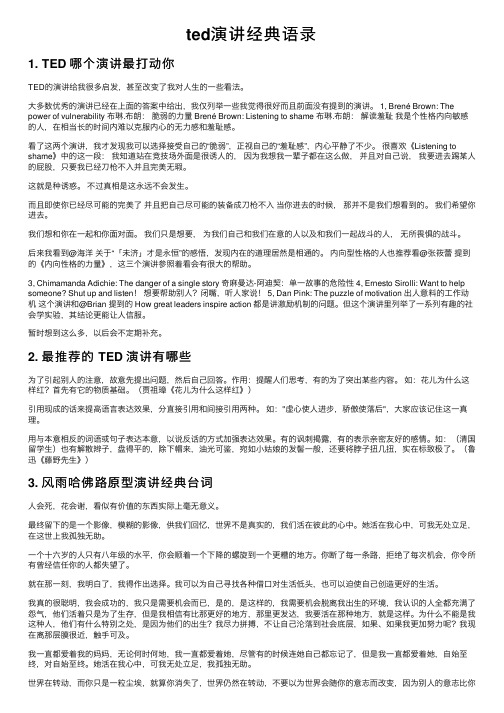
ted演讲经典语录1. TED 哪个演讲最打动你TED的演讲给我很多启发,甚⾄改变了我对⼈⽣的⼀些看法。
⼤多数优秀的演讲已经在上⾯的答案中给出,我仅列举⼀些我觉得很好⽽且前⾯没有提到的演讲。
1, Brené Brown: The power of vulnerability 布琳.布朗:脆弱的⼒量 Brené Brown: Listening to shame 布琳.布朗:解读羞耻我是个性格内向敏感的⼈,在相当长的时间内难以克服内⼼的⽆⼒感和羞耻感。
看了这两个演讲,我才发现我可以选择接受⾃⼰的“脆弱”,正视⾃⼰的“羞耻感”,内⼼平静了不少。
很喜欢《Listening to shame》中的这⼀段:我知道站在竞技场外⾯是很诱⼈的,因为我想我⼀辈⼦都在这么做,并且对⾃⼰说,我要进去踢某⼈的屁股,只要我已经⼑枪不⼊并且完美⽆瑕。
这就是种诱惑。
不过真相是这永远不会发⽣。
⽽且即使你已经尽可能的完美了并且把⾃⼰尽可能的装备成⼑枪不⼊当你进去的时候,那并不是我们想看到的。
我们希望你进去。
我们想和你在⼀起和你⾯对⾯。
我们只是想要,为我们⾃⼰和我们在意的⼈以及和我们⼀起战⽃的⼈,⽆所畏惧的战⽃。
后来我看到@海洋关于“「未济」才是永恒”的感悟,发现内在的道理居然是相通的。
内向型性格的⼈也推荐看@张筱蕾提到的《内向性格的⼒量》,这三个演讲参照着看会有很⼤的帮助。
3, Chimamanda Adichie: The danger of a single story 奇⿇曼达-阿迪契:单⼀故事的危险性 4, Ernesto Sirolli: Want to help someone? Shut up and listen!想要帮助别⼈?闭嘴,听⼈家说! 5, Dan Pink: The puzzle of motivation 出⼈意料的⼯作动机这个演讲和@Brian 提到的 How great leaders inspire action 都是讲激励机制的问题。
TED英文演讲:我们为什么要工作

TED英文演讲:我们为什么要工作我们为什么要工作?如果是想要赚钱,那就是最世俗的回答了。
因为我们忽略了我们作为人类最大的特质,就是创造力和有思想。
为什么工业革命之父亚当斯密曾说:在流水线工作的人会变得很笨,笨到人类的极点?因为他相信人类需要制度,通过薪酬的方式把人们变成要满足制度需要的人,剥夺了人们的创造机会。
所以人们不应该被设计活在别人的概念里而忽略自己本身的人性。
下面是小编为大家收集关于TED英文演讲:我们为什么要工作,欢迎借鉴参考。
演讲者:Barry SchwartzToday I'm going to talk about work. And the question I want to ask and answer is this: "Why do we work?" Why do we drag ourselves out of bed every morning instead of living our lives just filled with bouncing from one TED-like adventure to another?今天我要谈一谈工作。
我想跟大家一起讨论的问题是:“我们为什么要工作?”为什么我们每天早上要挣扎着起床(去上班)而不是享受生活,让我们的人生充满一个个像TED大会这样美妙的经历呢?You may be asking yourselves that very question. Now, I know of course, we have to make a living, but nobody in this room thinks that that's the answer to the question, "Why do we work?" For folks in this room, the work we do is challenging, it's engaging, it's stimulating, it's meaningful. And if we're lucky, it might even be important.你们也许也有同样的疑问吧。
TED演讲:我们以为自己知道的事中英文
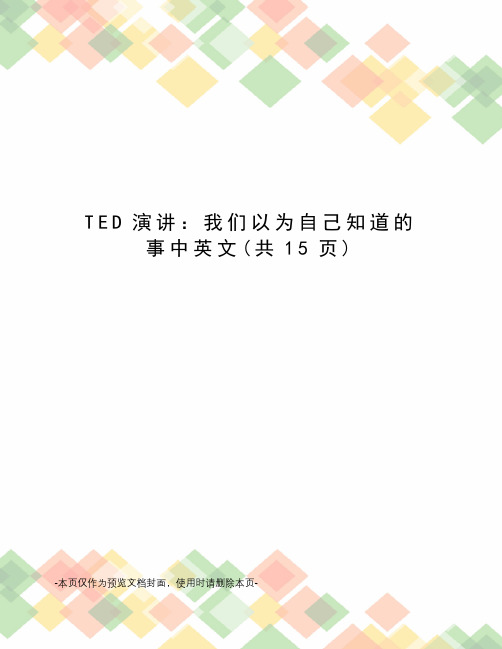
T E D演讲:我们以为自己知道的事中英文(共15页)-本页仅作为预览文档封面,使用时请删除本页-TED演讲:我们以为自己知道的事中英文这是一篇由网络搜集整理的关于TED演讲:我们以为自己知道的事中英文的文档,希望对你能有帮助。
以下是演讲全文:I'm going to try and explain why it is that perhaps we don't understand as much as we think we do. I'd like to begin with four questions. This is not some sort of cultural thing for the time of year. That's an in-joke, by the way.我会试着解释为何我们知道的东西很可能并没有我们自以为知道的多我想从四个问题开始,不是那种今年流行的文化问题对了,刚刚那句是个圈内笑话But these four questions, actually, are ones that people who even know quite a lot about science find quite hard. And they're questions that I've asked of science television producers, of audiences of science educators -- so that's science teachers -- and also of seven-year-olds, and I find that the seven-year-olds do marginally better than the other audiences, which is somewhat surprising.不过这四个问题,事实上即使是很懂科学的人也会觉得很难应答我拿这些问题去问科学节目制片人问那些有科学教育背景的观众也问教科学的老师还有七岁孩童我发现七岁孩童答得比其他人好这是有些令人惊讶So the first question, and you might want to write this down, either on a bit of paper, physically, or a virtual piece of paper in your head. And, for viewers at home, you can try this as well.第一个问题,我建议你把问题记下来抄在纸上,或想像中的纸上坐在电脑前的你也可以试着作答.A little seed weighs next to nothing and a tree weighs a lot, right I think we agree on that. Where does the tree get the stuffthat makes up this chair, right Where does all this stuff come from 种籽很轻,而大树很重,是吗我想我们都同意吧,大树用来制成椅子的东西是从哪来的对吧这些东西都是怎么来的(Knocks)(敲椅声)And your next question is, can you light a little torch-bulbwith a battery, a bulb and one piece of wire And would you be able to, kind of, draw a -- you don't have to draw the diagram, but would you be able to draw the diagram, if you had to do it Or would you just say, that's actually not possible问题二,你能否点亮一个小灯泡只用1个电池、1个灯泡、和1条电线那你能画出上述问题的图解吗不用真的画但如果需要的话,你能画出来吗还是你会说这个不可能The third question is, why is it hotter in summer than inwinter I think we can probably agree that it is hotter in summer thanin winter, but why And finally, would you be able to -- and you can sort of scribble it, if you like -- scribble a plan diagram of the solar system, showing the shape of the planets' orbits Would you be able to do that And if you can, just scribble a pattern.第三个问题,为什么夏天比冬天热大家应该都同意夏天比冬天还热但为何如此最后,你能不能简单的勾勒出太阳系的平面图... 呈现出行星轨道运行的形状你可以画得出来吗你画得出来的话,就把形状画出来OK. Now, children get their ideas not from teachers, asteachers often think, but actually from common sense, from experience of the world around them, from all the things that go on between them and their peers, and their carers, and their parents, and all of that. Experience. And one of the great experts in this field, of course, was, bless him, Cardinal Wolsey. Be very careful what you get into people's heads because it's virtually impossible to shift it afterwards, right?好,孩童对事物的概念不是老师教的老师时常这么以为,但实际上概念来自于常理来自于孩童对周遭世界的体验来自于他们跟同伴彼此交流还有跟保姆、父母亲、所有人交流的经验这个领域中的一个专家,对了,愿他安息就是渥西主教,他说要你将东西放进其他人的闹袋里的时候要小心因为那些东西几乎不会再改变,对吧?(Laughter)(笑声)I'm not quite sure how he died, actually. Was he beheaded inthe end, or hung?我不太清楚他的死因,真的他最后上了断头台还是被吊死(Laughter)(笑声)Now, those questions, which, of course, you've got right, and you haven't been conferring, and so on. And I -- you know, normally,I would pick people out and humiliate, but maybe not in this instance.现在回到那四个问题,大家都知道是什么问题了你们彼此之间也没有讨论答案我平时习惯点人站起来回答让他丢脸不过这次就不点了A little seed weighs a lot and, basically, all this stuff, 99 percent of this stuff, came out of the air. Now, I guarantee that about 85 percent of you, or maybe it's fewer at TED, will have saidit comes out of the ground. And some people, probably two of you,will come up and argue with me afterwards, and say that actually, it comes out of the ground. Now, if that was true, we'd have trucksgoing round the country, filling people's gardens in with soil, it'd be a fantastic business. But, actually, we don't do that. The mass of this comes out of the air. Now, I passed all my biology exams in Britain. I passed them really well, but I still came out of school thinking that that stuff came out of the ground.种籽可以很重,基本上所有的这些 99%都来自于空气我相信有85%的人,或许在你们TED会比较少会说木材来自于大地,而有些人也许你们中的一两位,可能结束后会来找我争论说木材其实是来自于大地若是如此,那我们就会有让卡车跑来跑去把人们的花园都填上土,那会是很棒的生意。
最激励人心的TED演讲之一:你最大的动力来自哪里?
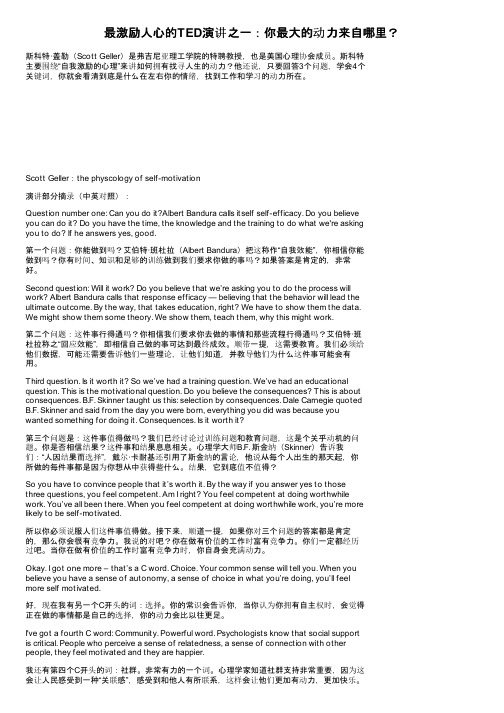
最激励人心的TED演讲之一:你最大的动力来自哪里?斯科特·盖勒(Scott Geller)是弗吉尼亚理工学院的特聘教授,也是美国心理协会成员。
斯科特主要围绕“自我激励的心理”来讲如何拥有找寻人生的动力?他还说,只要回答3个问题,学会4个关键词,你就会看清到底是什么在左右你的情绪,找到工作和学习的动力所在。
Scott Geller:the physcology of self-motivation演讲部分摘录(中英对照):Question number one: Can you do it?Albert Bandura calls itself self-efficacy. Do you believeyou can do it? Do you have the time, the knowledge and the training to do what we're askingyou to do? If he answers yes, good.第一个问题:你能做到吗?艾伯特·班杜拉(Albert Bandura)把这称作“自我效能”,你相信你能做到吗?你有时间、知识和足够的训练做到我们要求你做的事吗?如果答案是肯定的,非常好。
Second question: Will it work? Do you believe that we’re asking you to do the process willwork? Albert Bandura calls that response efficacy — believing that the behavior will lead theultimate outcome. By the way, that takes education, right? We have to show them the data.We might show them some theory. We show them, teach them, why this might work.第二个问题:这件事行得通吗?你相信我们要求你去做的事情和那些流程行得通吗?艾伯特·班杜拉称之“回应效能”,即相信自己做的事可达到最终成效。
Ted演讲稿:让人意想不到的提高生产力诀窍(中英对照)

Ted演讲稿:让人意想不到的提高生产力诀窍The unexpected key to boosting yourproductivity你有没有曾经希望自己不要再拖延了,要像机器一样高效?你是个人类,所以这是不可能的,但是企业家丹·谢波尔(Dan Shipper)说没关系。
来了解一下如何利用你的意识、观察和试验扫清障碍,完成更多的任务。
Ever wished you could stop procrastinating and just be as efficient as a machine? Since you're a human, that's not going to happen -- but that's OK, says entrepreneur Dan Shipper. Here's how you can use awareness, observation and experimentation to clear your own way to getting more done.我一直默默想变成一台机器。
我想,如果我是一台机器,我就不会不小心忽视一些事,我就不会忘事,我就会按时完成每一件该做的事。
我知道有些人就是这样的,我想知道他们是怎么做到的。
几年前,我做了一个新闻稿系列,名叫《超级组织者》,其中刊载了各个行业中的50 位优秀员工的故事。
我和一位经理聊过,他/她会以15 分钟为单位记录下一天中做的每一件事。
我和一位投资者聊过,他/她会在表格中记录下碰到的每一个人,我和一位CEO 聊过,他/她的日程表基本上就是空的,从来不开会。
我也在自己身上试过很多诀窍,让我更接近理想状态。
我试过在睡觉的时候用胶带把嘴贴上,盯着太阳灯看,增强我的精力。
我画下了心目中的自己,尝试了各种各样挑战人体化学的营养品。
有些我试过的东西确实有效,有些没什么用处。
TED演讲《为什么我们要工作》
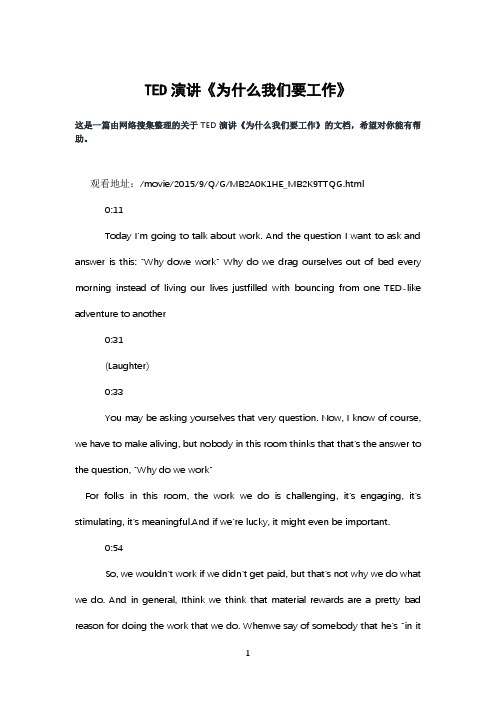
TED演讲《为什么我们要工作》这是一篇由网络搜集整理的关于TED演讲《为什么我们要工作》的文档,希望对你能有帮助。
观看地址:/movie/2015/9/Q/G/MB2A0K1HE_MB2K9TTQG.html 0:11Today I'm going to talk about work. And the question I want to ask and answer is this: "Why dowe work" Why do we drag ourselves out of bed every morning instead of living our lives justfilled with bouncing from one TED-like adventure to another0:31(Laughter)0:33You may be asking yourselves that very question. Now, I know of course, we have to make aliving, but nobody in this room thinks that that's the answer to the question, "Why do we work"For folks in this room, the work we do is challenging, it's engaging, it's stimulating, it's meaningful.And if we're lucky, it might even be important.0:54So, we wouldn't work if we didn't get paid, but that's not why we do what we do. And in general, Ithink we think that material rewards are a pretty bad reason for doing the work that we do. Whenwe say of somebody that he's "in itfor the money," we are not just being descriptive.1:12(Laughter)1:13Now, I think this is totally obvious, but the very obviousness of it raises what is for me anincredibly profound question. Why, if this is so obvious, why is it that for the overwhelmingmajority of people on the planet, the work they do has none of the characteristics that get us upand out of bed and off to the office every morning How is it that we allow the majority of peopleon the planet to do work that is monotonous, meaningless and soul-deadening Why is it that ascapitalism developed, it created a mode of production, of goods and services, in which all thenonmaterial satisfactions that might come from work were eliminated Workers who do this kindof work, whether they do it in factories, in call centers, or in fulfillment warehouses, do it for pay.There is certainly no other earthly reason to do what they do except for pay.2:14So the question is, "Why"And here's the answer: the answer is technology. Now, I know, I know-- yeah, yeah, yeah, technology, automation screws people, blah blah -- that's not what I mean.I'm not talking about the kind of technology that has enveloped our lives, and that people cometo TED to hear about. I'm not talking about the technology of things, profound though that is.I'm talking about another technology. I'mtalking about the technology of ideas. I call it, "ideatechnology" -- how clever of me.2:49(Laughter)2:51In addition to creating things, science creates ideas. Science creates ways of understanding. And inthe social sciences, the ways of understanding that get created are ways of understandingourselves. And they have an enormous influence on how we think, what we aspire to, and how weact.3:11If you think your poverty is God's will, you pray. If you think your poverty is the result of yourown inadequacy, you shrink into despair. And if you think your poverty is the result of oppressionand domination, then you rise up in revolt. Whether your response to poverty is resignation orrevolution, depends on how you understand the sources of your poverty. This is the role thatideas play in shaping us as human beings, and this is why idea technology may be the mostprofoundly important technology that science gives us.3:50And there's something special about idea technology, that makes it different from the technologyof things. With things, if the technology sucks, it just vanishes, rightBad technology disappears.With ideas -- false ideas about human beings willnot go away if people believe that they're true.Because if people believe that they're true, they create ways of living and institutions that areconsistent with these very false ideas.4:25And that's how the industrial revolution created a factory system in which there was really nothingyou could possibly get out of your day's work, except for the pay at the end of the day. Becausethe father -- one of the fathers of the Industrial Revolution, Adam Smith -- was convinced thathuman beings were by their very natures lazy, and wouldn't do anything unless you made it worththeir while, and the way you made it worth their while was by incentivizing, by giving themrewards. That was the only reason anyone ever did anything. So we created a factory systemconsistent with that false view of human nature. But once that system of production was in place,there was really no other way for people to operate, except in a way that was consistent withAdam Smith's vision. So the work example is merely an example of how false ideas can create acircumstance that ends up making them true.5:22It is not true that you "just can't get good help anymore." It is true that you "can't get good helpanymore" when you give people work to do that is demeaning and soulless. And interestinglyenough, Adam Smith -- the same guy who gave us this incredible invention of mass production,and division of labor -- understood this. He said, of people who worked in assembly lines, of menwhoworked in assembly lines, he says: "He generally becomes as stupid as it is possible for ahuman being to become." Now, notice the word here is "become." "He generally becomes asstupid as it is possible for a human being to become." Whether he intended it or not, what AdamSmith was telling us there, is that the very shape of the institution within which people workcreates people who are fitted to the demands of that institution and deprives people of theopportunity to derive the kinds of satisfactions from their work that we take for granted.6:28The thing about science -- natural science -- is that we can spin fantastic theories about thecosmos, and have complete confidence that the cosmos is completely indifferent to our theories.It's going to work the same damn way no matter what theories we have about the cosmos. Butwe do have to worry about the theories we have of human nature, because human nature will bechanged by the theories we have that are designed to explain and help us understand humanbeings.7:02The distinguished anthropologist, Clifford Geertz, said, years ago, that human beings are the"unfinished animals." And what he meant by that was that it is only human nature to have ahuman nature that is very much the product of the society in which people live. That humannature, that is to say our human nature, is much more created than it is discovered. We designhuman nature by designing the institutions within which people live and work.7:36And so you people -- pretty much the closest I ever get to being with masters of the universe --you people should be asking yourself a question, as you go back home to run your organizations.Just what kind of human nature do you want to help design?7:53Thank you.。
我渴望的职业英语演讲稿带翻译

我渴望的职业英语演讲稿兼翻译I have a dream is to be an English teacher. The reason of this is I like English, and also I like my English teacher very much, so I want to be an English teacher as him. I will love my job, and love each of my students. I will teach my students very well, and tell them many interesting stories and teach them to learn beautiful English songs. In order to achieve my dream, I think I should start from now on. First of all, I should learn hard, not only English, but also other subjects. I need to go to college to get a good education. Next, I should learn how to communicate and get along well with other people, especially children. Then, I will watch and learn my teachers' teaching methods and skills in teaching. Hope my dream will come true.我有一个梦想是当一名英语老师。
原因是我喜欢英语,我也喜欢我的英语。
我非常喜欢英语老师,所以我想当一名英语老师。
【工作狂英语演讲稿】WhateverHappenedtothePeopleWhoWork
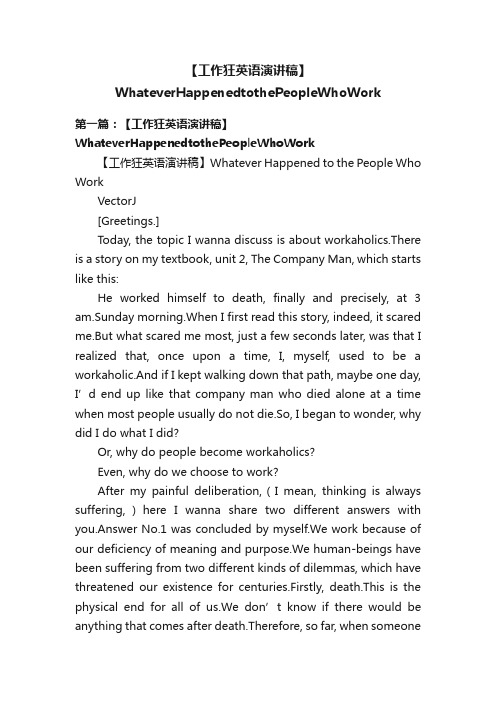
【工作狂英语演讲稿】WhateverHappenedtothePeopleWhoWork第一篇:【工作狂英语演讲稿】WhateverHappenedtothePeopleWhoWork【工作狂英语演讲稿】Whatever Happened to the People Who WorkVectorJ[Greetings.]Today, the topic I wanna discuss is about workaholics.There is a story on my textbook, unit 2, The Company Man, which starts like this:He worked himself to death, finally and precisely, at 3 am.Sunday morning.When I first read this story, indeed, it scared me.But what scared me most, just a few seconds later, was that I realized that, once upon a time, I, myself, used to be a workaholic.And if I kept walking down that path, maybe one day, I’d end up like that company man who died alone at a time when most people usually do not die.So, I began to wonder, why did I do what I did?Or, why do people become workaholics?Even, why do we choose to work?After my painful deliberation,(I mean, thinking is always suffering,)here I wanna share two different answers with you.Answer No.1 was concluded by myself.We work because of our deficiency of meaning and purpose.We human-beings have been suffering from two different kinds of dilemmas, which have threatened our existence for centuries.Firstly, death.This is the physical end for all of us.We don’t know if there would be anything that comes after death.Therefore, so far, when someonehas died, we say he has been completely removed, or erased, from this world and this reality.Secondly, the possible meaninglessness of life itself.This may be the kind of truth we are not happy to confront, but we have to admit that there could be a great chance that a man’s life is created by accident and, also, full of uncertainty.This is why we have the Nihilism theory.Think about what the Romanian philosop her Emil once said, “I’m simply an accident.Why take any of this seriously?”Faced with these two insurmountable problems, firstly death, secondly the possible meaninglessness of life itself, the sense of self-realization brought by hard working could be the only solution towards a truly happy and meaningful life.Next, answer No.2.Workaholic is actually a global phenomenon because we all are surrounded by snobs.This was derived from an English author named Alain de Botton, from one of his speeches on TED.From his opinion, in this society, we have nothing in the center that is non-human.We are the first society where we don’t worship anything other than ourselves.It is all about human.No more gods.Our heroes are human heroes.Why not? Hey, think about this.We even started sending people into the space.So under this atmosphere, a huge number of people have become snobs.And what is a snob?A snob is anybody who takes a small part of you and uses that to come to a complete vision of who you are.And the dominant snobbery nowadays is job snobbery.For example, just as Botton said in his speech, the first question you tend to ask when you meet somebody at a party is “what do you do”.In this case, our work, our jobs are so closely related to our self image, even our social status.We so desperately care about our image and the way others treat us, which compels us to workharder and harder.This was supposed to be the end of my speech.However, I wanna leave this more encouraging, less depressing.So I began to think what if I could say something to other workaholics, or myself in the past.It was a piece of advice from Neil Gaiman, one of my favorite freelancers, from his speech at the University of the Arts in Philadelphia.He said, “I learned to write by writing.I tended to do anything as long as it felt like an adventure, and to stop when it felt like work, which meant that life did not feel like work.”[The end.]第二篇:工作狂英语演讲稿Life can be beautiful like summer flowers, however, nowadays, a majority of people's life is full of work.Look at this word “workaholic”.Consists of “work” and “aholic”, it comes from alcoholic.A “workaholic” in the negative sense is populary characterized by a neglect of family and other social relations.Are you constantly staying late and coming in early? Are you working all the time? Do you talk about nothing else beyond work and pay no attention to your family and friends? If your answer is “yes”, you may be a workaholic like these people.Once you've solidified your reputation as the office workaholic, your workaholic ways are likely alienating once-valued associates, above and beyond the obvious grumbling of “you've making the rest of us look bad".Your colleagues may dread cooperating on a project with you.What's more, a heavy load of work will do harm to your healthy, Can you work in your whole life? Do you think about your families' feelings? After all, your family will be in your life a lot longer than most jobs you'll hold.Do you work to live or live to work? Someone may complain that there is too much work to have available time and they wereput too much pressure on, but look at this, a successful man reminds professional people : Your ability to say no to certain things give you the freedom to say yes to others.Work-life balance is a choice.And it is all depends on your attitude.Your life is in your hand, and as we all know, there are also many exciting things outside of work.For example, we can doing some exercise like playing tennis or basketball with friends, we can go out to buy some beautiful clothes or delicious food, we can also go to a movie to relax ourselves or even have a very good sleep like “Lan yang yang” does every day.Just like a sentence in the famous song written by Jason Mraz “Life is wonderful and life is meaningful.” Life wit hout working can be insignificance, but life full of work is terrible, too.We hope we can keep the work-life balance and enjoy both work and life.第三篇:工作狂英语演讲稿Life can be beautiful like summer flowers, however, nowadays, a majority of people's life is full of work.Look at this word “workaholic”.Consists of “work” and “aholic”, it comes from alcoholic.A “workaholic” in the negative sense is populary characterized by a neglect of family and other social relations.Are you constantly staying late and coming in early? Are you working all the time? Do you talk about nothing else beyond work and pay no attention to your family and friends? If your answer is “yes”, you may be a workaholic like these people.Once you've solidified your reputation as the office workaholic, your workaholic ways are likely alienating once-valued associates, above and beyond the obvious grumbling of “you've making the rest of us look bad".Your colleagues may dread cooperating on a project with you.What's more, a heavy load of work will do harm to your healthy, Can you work in yourwhole life? Do you think about your families' feelings? After all, your family will be in your life a lot longer than most jobs you'll hold.Do you work to live or live to work? Someone may complain that there is too much work to have available time and they were put too muchpressure on, but look at this, a successful man reminds professional people : Your ability to say no to certain things give you the freedom to say yes to others.Work-life balance is a choice.And it is all depends on your attitude.Your life is in your hand, and as we all know, there are also many exciting things outside of work.For example, we can doing some exercise like playing tennis or basketball with friends, we can go out to buy some beautiful clothes or delicious food, we can also go to a movie to relax ourselves or even have a very good sleep like “Lan yang yang” does every day.Just like a sentence in the famous song written by Jason Mraz “Life is wonderful and life is meaningful.” Lif e without working can be insignificance, but life full of work is terrible, too.We hope we can keep the work-life balance and enjoy both work and life.第四篇:工作狂老爸作文工作狂老爸作文9篇无论是身处学校还是步入社会,大家对作文都再熟悉不过了吧,作文是从内部言语向外部言语的过渡,即从经过压缩的简要的、自己能明白的语言,向开展的、具有规范语法结构的、能为他人所理解的外部语言形式的转化。
- 1、下载文档前请自行甄别文档内容的完整性,平台不提供额外的编辑、内容补充、找答案等附加服务。
- 2、"仅部分预览"的文档,不可在线预览部分如存在完整性等问题,可反馈申请退款(可完整预览的文档不适用该条件!)。
- 3、如文档侵犯您的权益,请联系客服反馈,我们会尽快为您处理(人工客服工作时间:9:00-18:30)。
I need to make a confession at the outset here. 开始前我必须先向你们告解A little over 20 years ago I did something that I regret, something that I'm not particularly proud of, something that, in many ways, I wish no one would ever know, but here I feel kind of obliged to reveal. 二十多年前我做了一件让我后悔莫及的事一件我丝毫不感到骄傲的事一件我希望没有任何人会知道的事但今日我认为我有必要揭发我自己In the late 1980s, in a moment of youthful indiscretion, I went to law school. 80年代晚期因为年少轻狂我进入法律学院就读Now, in America law is a professional degree: you get your university degree, then you go on to law school. 在美国法律学位是个专业学位你得先拿到学士才能进入法律学院And when I got to law school, I didn't do very well. 当我进入法律学院时我的成绩不怎么好To put it mildly, I didn't do very well. 客气地说我的成绩不怎么好I, in fact, graduated in the part of my law school class that made the top 90 percent possible. 我的毕业成绩成就了在我之上那其他九成的同学Thank you. 谢谢你们I never practiced law a day in my life; 我这辈子从来没做过律师I pretty much wasn't allowed to. 基本上那样做可能还会犯法But today, against my better judgment, against the advice of my own wife, I want to try dust off some of those legal skills -- what's left of those legal skills. 但今日我违背我的理性违背我太太的忠告我想重拾那些过去所学的诉讼技巧,所剩无几的诉讼技巧I don't want to tell you a story. 我不想向你们说故事I want to make a case. 而是提出一个陈述I want to make a hard-headed, evidence-based, dare I say lawyerly case, for rethinking how we run our businesses. 提出一个有根据货真价实的法庭陈述来重新思考我们的管理方法So, ladies and gentlemen of the jury, take a lookat this.陪审团的女士先生们请看看这个This is called the candle problem. 这便是有名的蜡烛问题Some of you might have seen this before. 你们之中有些人可能已经看过了It's created in 1945 by a psychologist named Karl Duncker. 它是在1945年由心理学家Karl Duncker所创造的Karl Dunker created this experiment that is used in a whole variety of experiments in behavioral science. Karl Duncker创造了这个实验在行为科学中被广泛运用And here's how it works.Suppose I'm theexperimenter.情况是假设我是实验者I bring you into a room. I give you a candle, Some thumbtacks and some matches. 我带你进入一个房间给你一根蜡烛一些图钉和火柴And I say to you, “your job is to attach the candle to the wall so the wax doesn't drip onto the table.”Now what would you do? 告诉你说现在尝试把蜡烛固定在墙上让烛泪不要滴到桌上你会怎么做Now many people begin trying to thumbtack the candleto the wall.许多人尝试用图钉把蜡烛钉在墙上Doesn't work. 行不通Somebody, some people -- and I saw somebody kind of make the motion over here -- some people have a great idea where they light the match, melt the side of the candle, try to adhere it to the wall. 有些人台下也有些人做出这样的动作有些人想到他们可以点燃火柴溶化蜡烛的底部尝试把它黏在墙上It's an awesome idea. Doesn't work. 好主意但行不通And eventually, after five or 10 minutes,most people figure out the solution, which you can see here. 差不多过了五到十分钟大部分的人便会想出解决办法就像图片上那样The key is to overcome what's called functionalfixedness.重点是克服功能固着You look at that box and you see it only as a receptacle for the tacks. 当你看到盒子你不过把它当成装大头针的容器But it can also have this other function, as a platform for the candle. The candle problem. 但它还有其它功能那就是作为蜡烛的平台Now I want to tell you about an experiment using the candle problem, done by a scientist named Sam Glucksberg, who is now at Princeton University in the U.S. 现在我想告诉你另一个实验利用蜡烛问题由一个现在在普林斯顿大学叫做Sam Glucksberg 的科学家所做的实验This shows the power of incentives. 这实验让我们看见动机的力量Here's what he did. He gathered his participants. 他是这么做的他将参与者聚集在一个房间里And he said,“I'm going to time you. How quickly you can solve this problem ?”告诉他们我要开始计时看看你们能多快解决这个问题To one group he said, “I'm going to time you to establish norms, averages for how long it typically takes someone to solve this sort of problem.”他对其中一群人说我只是想取个平均值看一般人需要花多久的时间才能解决这样的问题To the second group he offered rewards. 他提供奖励给另一群人He said,“If you're in the top 25 percent of the fastest times, you get five dollars. If you're the fastest of everyone we're testing here today, you get 20 dollars.”他说如果你是前25%最快解决问题的人就能拿到五块钱如果你是今日所有人里解答最快的你就有20块钱Now this is several years ago. Adjusted for inflation, it's a decent sum of money for a few minutes of work. It's a nice motivator. 这个实验是几年前的事了按照通货膨胀几分钟就能拿到20块是很不错的是个不错的诱因Question: How much faster did this group solve the problem? 问题是这群人比另一群人的解题速度快了多少呢?Answer: It took them, on average, three and a half minutes longer. 答案是平均来说他们比另一组人多花了三分半钟Three and a half minutes longer. Now this makes nosense right?整整三分半钟这不合理不是吗I mean, I'm an American. I believe in free markets. 我是个美国人我相信自由市场That's not how it's supposed to work. Right? 这个实验不太对劲吧对吗If you want people to perform better, you reward them. Right? 如果你想要人们做得更好你便给他们奖赏对吗Bonuses, commissions, their own reality show. 红利佣金他们自己的真人秀Incentivize them. That's how business works. 赋予他们动机这就是商业法则But that's not happening here. 但实验里却不是这样You've got an incentive designed to sharpen thinking and accelerate creativity, and it does just the opposite. 奖励是为了增强思考能力及创意但事实却是相反It dulls thinking and blocks creativity. 它阻断了思考和创意能力And what's interesting about this experiment is thatit's not an aberration.有趣的事情是这个实验不是误差This has been replicated over and over and overagain, for nearly 40 years.它被一再重复在过去的四十年间These contingent motivators -- if you do this, then you get that -- work in some circumstances. 这些不同的诱因如果你这样做你就得到那个在某些情况里是可行的But for a lot of tasks, they actually either don't work or, often, they do harm. 但在许多任务中他们不是没有作用更有可能产生反效果This is one of the most robust findings in social science, and also one of the most ignored. 这是在社会科学中一项最有力的发现同时也是最为人忽略的I spent the last couple of years looking at thescience of human motivation, particularly the dynamics of extrinsic motivators and intrinsic motivators. 过去两年我研究人类的动机尤其是那些外部的激励因素和内在的激励因素And I'm telling you, it's not even close. 我可以告诉你两者相差悬殊If you look at the science, there is a mismatch between what science knows and what business does. 如果你使用科学方法查证你会发现科学知识和商业行为之间有条鸿沟And what's alarming here is that our business 我们必须注意的是我们的商业机制想operating system -- think of the set of assumptions and protocols beneath our businesses, how we motivate people, how we apply our human resources -- it's built entirely around these extrinsic motivators, around carrots and sticks. 想这些商业的协议和假设我们如何激励人心如何运用人资全是以这些外部激励因素作为基础打手心给块糖That's actually fine for many kinds of 20th centurytasks.对许多20世纪的工作来说是可行的But for 21st century tasks, that mechanistic, reward-and-punishment approach doesn't work, often doesn't work, and often does harm. 但面对21世纪的工作这些机械化的奖惩分明的作法已经不管用了有时更招致反效果Let me show you what I mean. 让我呈现我想表达的So Glucksberg did another experiment similar to this where he presented the problem in a slightly different way, like this up here. Okey? Glucksberg做了一个类似的实验这次他给了他们一个比较不同的问题像这个图里面的Attach the candle to the wall so the wax doesn't drip onto the table. 实验对象必须要找出一个让蜡烛黏在墙上又不会流下烛泪的方法Same deal.You: we're timing for norms. 相同地这边:我们要的是平均时间You: we're incentivizing. 这边:一样的给他们不同的诱因What happened this time? 结果呢This time, the incentivized group kicked the other group's butt. 这次有诱因的那组人远远地胜过了另一组人Why? Because when the tacks are out of the box, it's pretty easy isn't it? 为什么一旦我们把图钉从盒子里拿出来问题就变得相当简单不是吗If-then rewards work really well for those sorts of tasks, where there is a simple set of rules and a clear destination to go to. 假设在这个情况下奖励就变得非常有郊在规则简单目标明显的情况下Rewards, by their very nature, narrow our focus, concentrate the mind; that's why they work in so many cases. 奖励产生了作用让我们集中精神变得专注这便是为何奖励在许多情况下有效的缘故And so, for tasks like this, a narrow focus, where you just see the goal right there, zoom straight ahead to it, they work really well. 当我们面对的工作是范围狭窄你能清楚见到目标向前直冲时奖励便非常有效But for the real candle problem, you don't want to be looking like this. 但在真正的蜡烛问题中你不能只是这样看The solution is not over here. The solution is onthe periphery.解答不在那里解答是在周围You want to be looking around. 你需要四处找寻That reward actually narrows our focus and restricts 奖励却令我们眼光狭隘限制了我们的our possibility. 想像力Let me tell you why this is so important. 让我告诉你这个问题的重要性In western Europe, in many parts of Asia, in North America, in Australia, white-collar workers are doing less of this kind of work, and more of this kind of work. 在西欧亚洲的许多地方北美洲澳洲白领工作者比较少处理这种问题更多的是这种问题(指钉放在盒中的)That routine, rule-based, left-brain work--certainkinds of accounting, certain kinds of financial analysis, certain kinds of computerprogramming--has become fairly easy to outsource, fairly easy to automate. 那些例行的常规性的左脑式的工作一些会计一些财务分析一些电脑编程变得极为容易外包变得自动化Software can do it faster. 软件能处理的更快Low-cost providers around the world can do it cheaper. 世界其他地方的低价供应商能以更便宜的成本来完成So what really matters are the more right-brained creative, conceptual kinds of abilities. 所以更重要的是右脑的创意概念式的能力Think about your own work. 想想你的工作Think about your own work. 想想你自己的工作Are the problems that you face, or even the problems we've been talking about here, are those kinds of problems--do they have a clear set of rules, and a single solution? No. 你所面对的问题甚至是我们今天所谈论到的问题这些问题它们有清楚的规则和一个简单的解答吗没有The rules are mystifying. 它们的规则模糊The solution, if it exists at all, is surprising and not obvious. 解答如果有解答的话通常是令人意外而不明显的Everybody in this room is dealing with their own version of the candle problem. 在这里的每个人都在尝试解决他自己的蜡烛问题And for candle problems of any kind, in any field, those if-then rewards, the things around which built so many of our businesses, don't work. 对所有形式的蜡烛问题在所有领域这些如果-那就的奖励这些在商业世界里无处不在的奖惩系统其实没用Now, I mean it makes me crazy. 这简直让我发狂And this is not--here's the thing. 这不是重点是This is not a feeling. 这不是一种感觉Okey? I'm a lawyer; I don't believe in feelings. 我是个律师我才不信什么感觉This is not a philosophy. 这也不是哲学I'm an American; I don't believe in philosophy. 我是个美国人我才不信什么哲学This is a fact--or, as we say in my hometown of Washington, D.C., a true fact. 这是真相或是我们在华盛顿特区的政治圈常说的一个事实真相Let me give you an example of what I mean. 让我给你一个例子Let me marshal the evidence here, because I'm not telling you a story, I'm making a case. 让我收集这些证据因为我不是在告诉你一个故事而是陈述一个案子Ladies and gentlemen of the jury, some evidence: 陪审团的女士们先生们证据在此Dan Ariely, one of the great economists of our time, he and three colleagues, did a study of some MIT students. Dan Ariely 一位当代伟大的经济学家他和三位同仁对麻省理工学院的学生做了一些研究They gave these MIT students a bunch of games, games that involved creativity, and motor skills, and concentration. 他给这些学生一些游戏一些需要创造力的游戏需要动力和专注And the offered them, for performance, three levels of rewards: small reward, medium reward, large reward. 依照他们的表现给他们三种不同程序的奖励小奖励中奖励大奖励Okey? If you do really well you get the large reward, on down. 如果你做得好你就得到大奖励依此类推What happened? As long as the task involved onlymechanical skill bonuses worked as they would be expected: the higher the pay, the better the performance. 结果呢只要是机械形态的工作红利就像我们所认知的奖励越高表现越好Okey? But one the task called for even rudimentary cognitive skill, a larger reward led to poorer performance. 是的但如果这个工作需要任何基本的认知能力越大的奖励却带来越差的表现Then they said:“Okey let's see if there's any cultural bias here. Lets go to Madurai, India and test this.”于是他们说让我们试试是否有什么文化差距让我们去印度的马杜赖试试Standard of living is lower. 生活水平较低In Madurai, a reward that is modest in North American standards, is more meaningful there. 在马杜赖北美标准的中等奖励在这里有意义多了Same deal. A bunch of games, three levels of rewards. 一样地一些不同游戏三种奖励What happens? 结果呢People offered the medium level of rewards did no better than people offered the small rewards. 中等奖励的人做的不比那些小奖励的人好But this time, people offered the highest rewards, they did the worst of all. 但这次那些能够得到大奖励的人表现最差In eight of the nine tasks we examined across three experiments, higher incentives led to worse performance. 三种实验中在我们提供的九个游戏中有八个奖励越高的表现越差Is this some kind of touchy-feely socialist 难道这是一种感情用事的社会主义的阴conspiracy going on here? 谋诡计吗No. These are economists from MIT, from Carnegie Mellon, from the University of Chicago. 不这些经济学家来自麻省理工卡内基梅隆和芝加哥大学And do you know who sponsored this research? 你知道赞助这实验的是谁吗The Federal Reserve Bank of the United States. 是美国联邦储备银行That's the American experience. 完全的美国经验Let's go across the pond to the London School of Economics--LSE, London School of Economics, alma mater of 11 Nobel Laureates in economics. 让我们跨海到伦敦政经学院看看LSE 伦敦经济学院十一位诺贝尔经济奖得主的母校Training ground for great economic thinkers like George Soros, and Friedrich Hayek, and Mick Jagger. 训练伟大经济学家的地方有乔治索罗斯弗里德里希·哈耶克和滚石乐团的米克·贾格尔Last month, just last month, economists at LSE looked at 51 studies of pay-for-performance plans, inside of companies. 上个月才刚过去的那个月政经学院的经济学家汇整了51个关于企业内部绩效薪酬的研究Here's what the economists there said:“ We find that financial incentives can result a negative impact on overall performance.”这些经济学家说我们发现金钱的诱因能对整体绩效带来负面效果There is a mismatch between what science knows andwhat business does.科学知识和商业行为之间有条鸿沟And what worries me, as we stand here in the rubble of the economic collapse, is that too many organizations are making their decisions, their policies about talent and people, based on assumptions that are outdated, unexamined, and rooted more in folklore than in science. 我所忧心的是在我们站在金融风暴废墟之间的此刻仍然有太多团体仍然以一些过时的未经验证的非科学的几乎是来自天方夜谭的假设来制定规则和管理人事And if we really want to get out of this economic mess, and if we really want high performance on those definitional tasks of the 21st century, the solution is not to do more of the wrong things, to entice people with a sweeter carrot, or threaten them with a sharper stick. 如果我们真的想要摆脱这个经济危机如果我们真的想要在这些属于21世纪的核心工作中获取绩效的话这解答无异是错上加错用胡萝卜来吸引人或是用棍子来威胁人We need a whole new approach. 我们需要一种新做法And the good news about all of this is that the scientists who've been studying motivation have given us this new approach. 好消息是这些研究人类动机的科学家已经给了我们一个新方向It's an approach built much more around intrinsicmotivation.这个新方向讲求内在的诱因Around the desire to do things because they matter,because we like it, because they're interesting, because they are part of something important. 我们想做的是因为它能改变世界因为我们喜欢因为它很有趣因为它能影响的范围很广And to my mind, that new operating system for our businesses revolves around three elements: autonomy, mastery and purpose. 在我心里这种新的商业机制围绕在三个基础上自主性掌握力和使命感Autonomy: the urge to direct our own lives. 自主性想要主掌自己人生的需求Mastery: the desire to get better and better at something that matters. 掌握力想要在举足轻重的事情上做得更好的欲望Purpose: the yearning to do what we do in the service of something larger than ourselves. 使命感希望我们所做的事情是为了更高远的理想的渴望These are the building blocks of an entirely newoperating system for our businesses.这些便是建立新商业机制的基石I want to talk today only about autonomy. 今天我只想提到自主性In the 20th century, we came up with this idea ofmanagement.20世纪产生了管理学的想法Management did not emanate from nature. 管理学不是自然发生的Management is like -- it's not a tree, it's a television set. 管理学像是它不是一棵树而是个电视机Okey? Somebody invented it. 对吗有人发明它And it doesn't mean it's going to work forever. 不代表它永远都好用Management is great. 管理学很好Trditional notions of management are great if you want compliance. 传统的管理学的概念是好的如果你需要的是服从But if you want engagement, self-direction works better. 但如果你想要员工全心投入自动自发更好Let me give you some examples of some kind if radical notions of self-direction. 有关自动自发让我给你一些革命性的例子What this means -- you don't see a lot of it, but you see the first stirrings of something really interesting going on, because what it means is paying people adequately and firly, absolutely -- getting the issue of money off the table, and then giving people lots of autonomy. 代表着这样的例子不多但是你可以发现一些有趣的事情正开始发生因为他代表着付给人们合理与足够的工资让钱不再是问题然后给人们很大的自主权Let me give you some examples. 让我举一些例子How many of you have heard of the company Atlassian? 在座谁听过一家叫Atlassian的公司It looks like less than half. 看起来一半都不到Atlassian is an Australian software company. Atlassian是一个澳大利亚的软件公司And they do something incredibly cool. 他们做了一件很酷的事A few times a year they tell their engineers, “Go for the next 24 hours and work on anything you want, as long as it's not part of your regular job. 一年有几次他们跟公司里的软件工程师说接下来的24个小时去做你自己想做的事只要它和你每天的工作无关Work on anything you want.”随便你要做什么都行So that engineers use this time to come up with a cool patch for code, come up with an elegant hack. 这些工程师便利用这些时间写出一套有趣的编程优雅地包装这些想法Then they present all of the stuff that they've developed to their teammates, to the rest of the company, in this wild and wooly all-hands meeting at the end of the day. 在那天的最后在这个全员到齐万众一心的会议中对他们的组员和整个公司介绍他的发明And then, being Australians, everybody has a beer. 当然身为澳大利亚人大家都得来罐啤酒They call them FedEx Days. 他们叫这是FedEx联邦快递日Why? Because you have to deliver somethingovernight.国为你必须在隔夜交出你的作品It's pretty. It's not bad. It's a huge trademark violation, but it's pretty clever. 很不赖的想法虽然违反商标法但这个想法很聪明That one day of intense autonomy has produced a whole array of software fixes that might never have existed. 在高度自主的一日中他们做出了许多软件编程的革新之前根本没人想到的And it's worked so well that Atlassian has taken it to the next level with 20 Percent Time -- done, famously, at Google -- where engineers can work, spend 20 percent of their time working on anything they want. 这个计划的成功让Altlassian更进一步的发明了五分之一时间谷歌把这个想法发扬光大工程师可以用五分之一的时间做所有他们想做的事情They have autonomy over their time, their task, their team, their technique. 他们可以自由的分配他们的时间工作组员和作法Okey? Radical amounts of autonomy. 就是这样完全的自主权And at Google, as most as many of you know, about half of the new products in a typical year are birthed during that 20 Percent Time: things like Gmail, Orkut, Google News. 诚如大家说所在谷歌一年中有一半的新商品都来自这五分之一时间像谷歌信箱 Qrkut 谷歌新闻Let me give you an even more radical example of it: something called the Results Only Work Environment, the ROWE, created by two American consultants, in place at about a dozen companies around North America. 让我给你一个更具革命性的例子一个叫做只论结果的工作环境简写是ROWE 由两个美国分析师所创造用在十多家北美公司上In a ROWE people don't have schedules. 在ROWE之中人们没有日程表They show up when they want. 他们想来就来They don't have to be in the office at a certain time, or any time. 他们不需要在特定时间到公司任何时间They just have to get their work done. 他们只需要把工作完成How they do it, when they do it, where they do it, is totally up to them. 怎么做何时做在哪里做都取决于他们自己Meetings in these kinds of environments areoptional.甚至连开会都是选择性的What happens? 结果呢Almost across the board, productivity goes up, worker engagement goes up, worker satisfaction goes up, turnover goes down. 几乎所有公司的生产力都提升了工作投入度提升工作满意度提升人才流失降低Autonomy, mastery and purpose, these are the buiding blocks of a new way of dong things. 自主性掌握力和使命感这便是新工作方式的新基础Now some of you might look at this and say,“hmm,that sounds nice, but it's utopian.”在座的某些人可能会看着然后说嗯听起来不错就是太理想化了And I say,“Nope. I have proof.”我说错了我有证据The mid-1990s, Microsoft started an encyclopedia called Encarta. 在90年代中微软开始了一个叫做Encarta的百科全书计划They had deployed all the right incentives, all the right incentives. They paid professionals to write and edit thousands of articles. 他们使用了所有正确的诱因所有的诱因他们付钱给专业人士让他们写和编辑这些文章Well-compensated managers oversaw the whole thing to make sure it came in on budget and on time. 收入颇丰的主管们监督着整个计划确定它不会超过预算和时间A few years later another encyclopedia got started. 几年后另一个百科全书计划开始了Different model, right? 完全不同的模式Do it for fun. No one gets paid a cent, or a Euro or a Yen. 为了兴趣而作没有人能拿到任何一毛钱Do it because you like to do it. 因为自己喜欢而做Now if you had, just 10 years ago, if you had goneto an economist, anywhere, and said,“Hey, I've got these two different models for creating an encyclopedia. If they went head to head, who would win?”如果你在十年前到一个经济学家那里去对他说我有两种撰写百科全书的模式拿来相比谁会赢10 years ago you could not have found a single sober economist anywhere on planet Earth who would have predicted the Wikipedia model.十年前你绝对不会找到任何一个清醒的经济学家在这个地球的任何角落能够预知维基百科的模式This is the titanic battle between these twoapproaches.这是一个两种模式之间的世纪战役This is the Ali-Frazier of motivation. Right? 动机的阿里与弗雷泽之战This is the Thrilla' in Manila. 就像那场在马尼拉的拳王之战Alright? Intrinsic motivators versus extrinsicmotivators.是吗内在动机和外在动机Autonomy, mastery and purpose, versus carrot and sticks. And who wins? 自主性掌握力和使命感和胡萝卜和棍子谁赢了Intrinsic motivation, autonomy, mastery and purpose, in a knockout. Let me wrap up. 内在动机自主性掌握力和使命感获得压倒性胜利结论是There is a mismatch between what science knows andwhat business does.科学知识和商业行为之间And here is what science knows. 有条鸿沟One: Those 20th century rewards, those motivators we think are a natural part of business, do work, but only in a surprisingly narrow band of circumstances. 一这些20世纪的奖励这些我们当作商业中自然一部分的诱因是有用的但意外地只在一个非常狭窄的情况下Two: Those if-then rewards often destroycreativity.二这些奖励往往会破坏创造力Three: The secret to high performance isn't rewards and punishments, but that unseen intrinsic drive -- the drive to do things for their own sake. 三高绩效的秘密不是奖励和惩罚而是看不见的内在动力让人为了自己而做的动力The drive to do things cause they matter. 让人有使命感的动力And here's the best part. Here's the best part. 最好的是We already know this. The science confirms what we know in our hearts. 我们了然于心科学不过确认了我们心里的声音So, if we repair this mismatch between what science knows and what business does, if we bring our motivation, notions of motivation into the 21st century, if we get past this lazy, dangerous, ideology of carrots and sticks, we can strengthen our business, we can solve a lot of those candle problems, and maybe, maybe, maybe we can change the world. 如果我们改变科学知识和商业行为之间有的那条鸿沟如果我们把我们的动机对诱因的想法带进21世纪如果我们越过懒惰的危险的理想化的胡萝卜和棍子的想法我们可以强化我们的公司解决许多的蜡烛问题那么或许或许或许我们便能改变世界I rest my case. 陈述完毕。
